Stories of the First Amendment in Action
Why during a global pandemic, in a time of profound civil unrest, when tens of millions of Americans are facing economic hardship, and public trust in journalists is eroding precipitously, are we talking about the First Amendment?
Because URI aspires to be a place where civil discourse creates change and students feel safe, supported, and free to express their views in classroom debates or campus protests. So we asked faculty, students, alumni, and staff to share how they are guided by the First Amendment in their work and their lives.
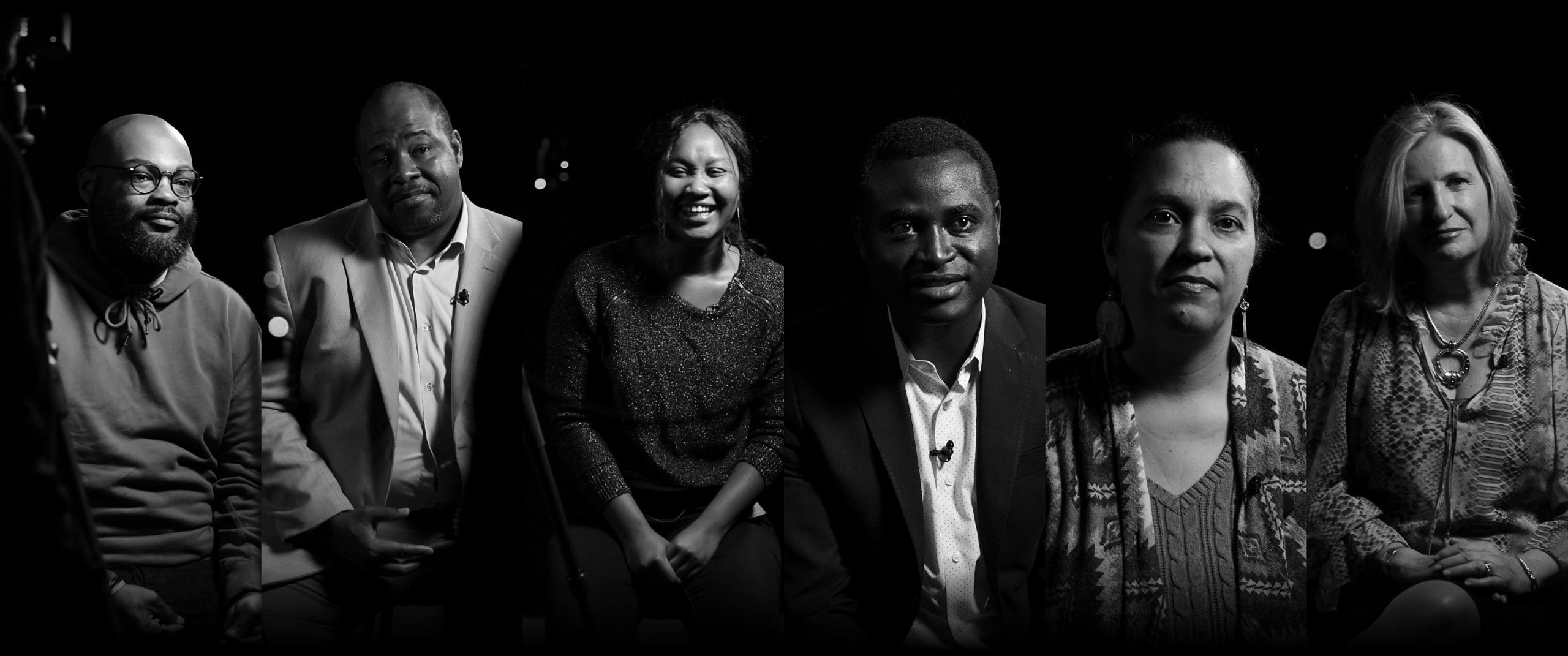
Stories of the First Amendment in Action Part 1
Speaking Truth
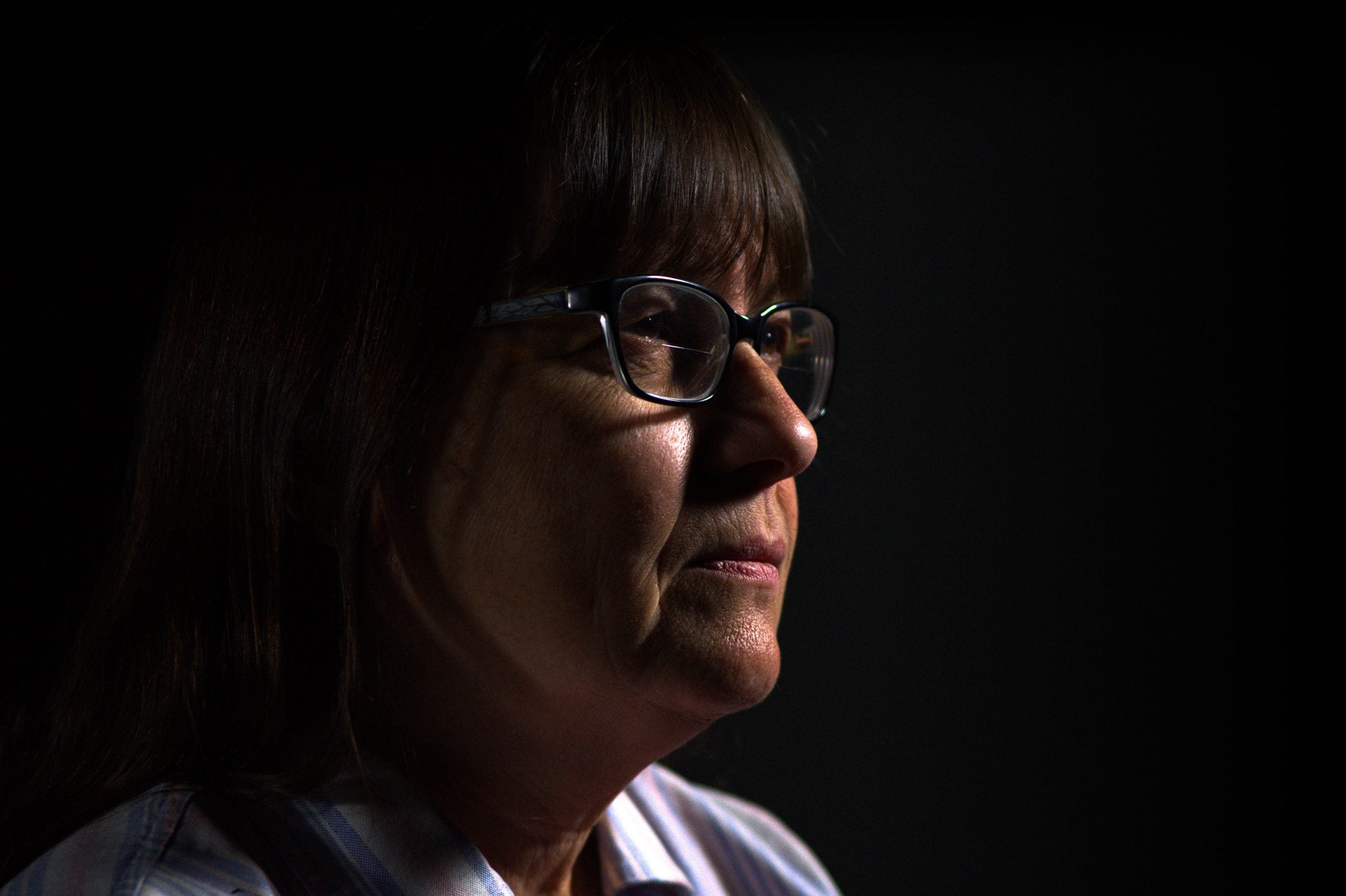
— Betty J. Cotter
The freedoms protected by the First Amendment are essential to democracy and to the mission and values of higher education. Without the freedom to express and explore new, different, and sometimes controversial ideas, how would society evolve?
The stories that follow are profiles in courage, integrity, and citizenship. They illustrate the importance of our freedom — and responsibility — to exercise our First Amendment rights.
We begin with accounts of award-winning journalists — Christiane Amanpour ’83, Hon. ’95, Vladimir Duthiers ’91, Hon. ’17, Thomas Farragher ’77, Hon. ’17, Betty J. Cotter, and the late Jim Taricani Hon. ’18 — who’ve stood nose-to-nose with formidable institutions to hold the powerful accountable and put vital information in the public view.
“Be truthful, not neutral.”
Christiane Amanpour ’83, Hon. ’95
Bosnia was a different war.
“It was a different animal,” CNN chief international anchor and host of PBS’s Amanpour & Company Christiane Amanpour told a packed Edwards Auditorium last September at the annual lecture series bearing her name. An animal hell-bent on annihilation.
Six months after the first Gulf War, Amanpour was covering the dissolution of the former Yugoslavia. “This was a civil war that was building to a genocide,” Amanpour said. “This was something that affected me personally.”
Journalists are taught that objectivity is fairness and that their reporting should reflect all viewpoints. But, in the case of the Bosnian genocide, practicing objectivity wasn’t necessarily getting to the truth, Amanpour discovered. “Be truthful, not neutral: I learned that in Sarajevo,” she said. It’s become her tagline.
“And it came about because we were telling the truth: stories of civilians — men, women, and children — being brutalized, besieged by the Bosnian Serbs, and their patrons, the Serbs, who had the armor, the personnel, the agenda — and who wanted to ethnically cleanse parts of Bosnia to create a white, nationalist, Serb entity to carve off and attach as a greater Serbia. They thought this was their opportunity.”
World leaders did nothing, Amanpour said.
“Not the president of the United States, not the prime minister of Great Britain, nor the president of France. None of our democratic leaders wanted to follow their international duty under the Geneva Convention, which says when you see ethnic cleansing, genocide, deep violations of the most important international laws, you actually have to respond,” Amanpour said.
But because the war happened in the era of 24/7 news, the world watched. “We didn’t just do one story. We did all the important stories for years,” Amanpour said. “Bosnia was the leading story around the world — in the United States, in Europe, and in Muslim countries — because it was Muslim civilians, European Muslims, who were being slaughtered like animals.”
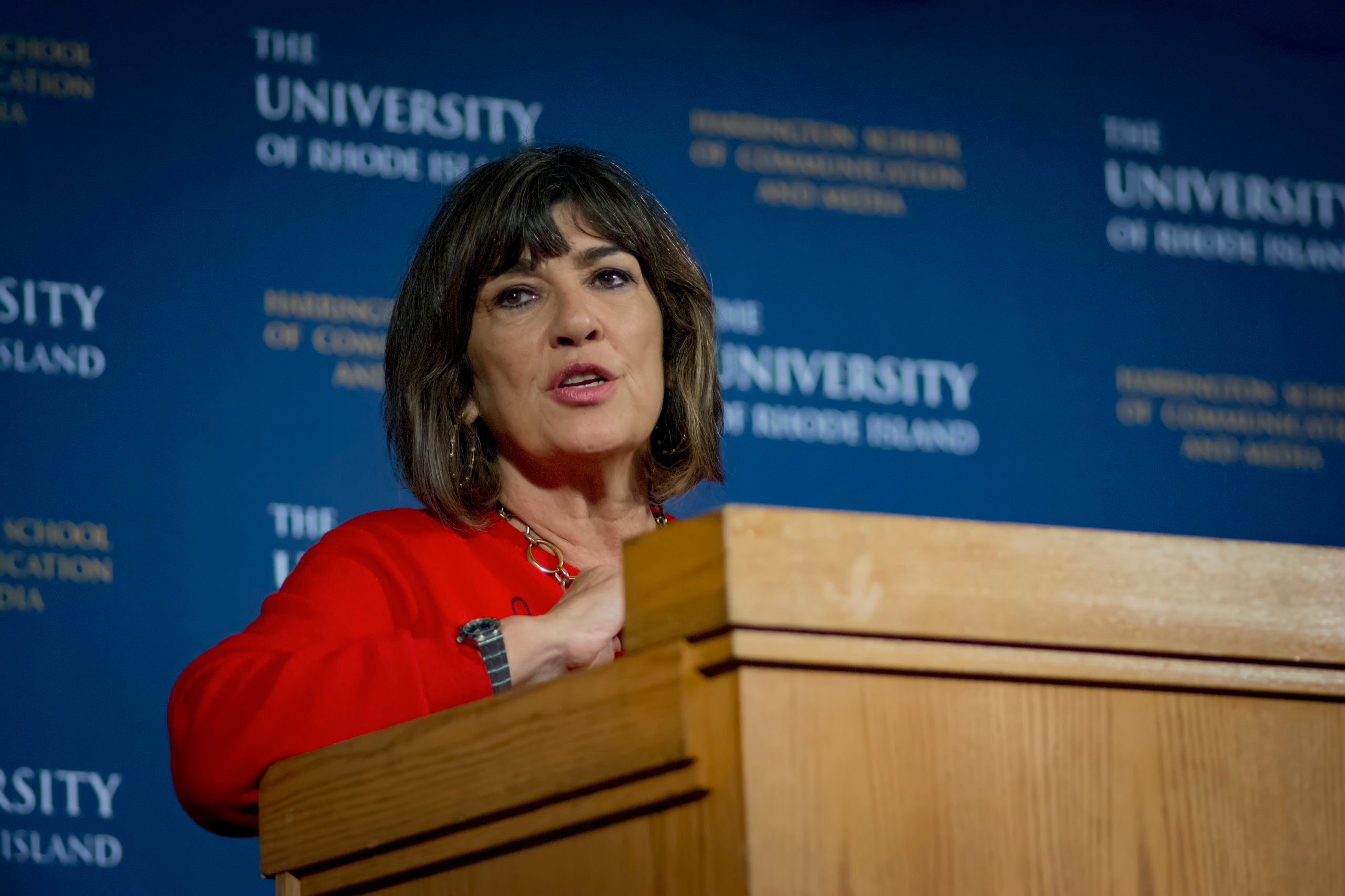
CNN and Amanpour were accused of bias. “I was upset, and I had to re-examine our golden rule, objectivity,” Amanpour told the audience. “It made me examine what I was doing and what we had to do as journalists. What I had done was tell the truth. When you get all sides of the story, you’re being objective. But when you then mistakenly believe that objectivity is neutrality, you create a false factual and false moral equivalence.
“In these situations, if you do that, you are an accomplice.”
Such situations underscore the value of the fourth estate, and, by association, the First Amendment, Amanpour said. “We like to call ourselves the fourth estate. That’s not just a throwaway title. That means we are fundamental pillars of what creates and maintains a strong and robust democracy,” Amanpour said. “In countries where there is a strong journalistic profession, the countries are healthier.
“And in this world where information is one of the most important and valuable commodities, those who are the purveyors of the information, i.e., the journalists, have to continue to do that in an environment that is safe and free.”
“They would not be forgotten.”
Vladimir Duthiers ’91, Hon. ’17
On a spring evening in Nigeria in April 2014, 276 Chibok schoolgirls were kidnapped by the terrorist group Boko Haram. The world wanted the girls returned; the Nigerian government felt the pressure. At a Nigerian Ministry of Defence press briefing on the kidnappings, a government official threw a crumpled piece of paper at then-CNN correspondent Vladimir Duthiers. In Nigeria, reporting the government unfavorably was tantamount to sedition.
“The official said, ‘Vlad, stop being disrespectful. Stop propagandizing Nigeria,'” Duthiers recalls. “They believed the reporting we were doing was making them out to be bad guys. It was the first time I heard charges of unreal or fake news.”
In that moment, Duthiers, now a CBS News correspondent and CBSN anchor, realized that wadded paper lobbed in your direction could be a threat. It wasn’t the first time Duthiers risked retribution for his reporting. It wasn’t even the first time that year. In January of 2014, CNN reported on the first gay Nigerian to come out on television.
That year Nigeria signed the Same-Sex Marriage Prohibition Act into law. Duthiers’ job put him at great risk. “I could be thrown in jail for 10 years under this new law,” Duthiers said in a television interview with Christiane Amanpour. The law made it illegal for anyone to associate with a person perceived to be homosexual.
But Duthiers was of the Amanpour school of journalism. “Nigeria has freedom of the press. Its journalists can be outspoken and critical, but they face harassment and violence. As an American journalist, what was horrific to see in Nigeria was people being rounded up on suspicion of LGBTQ activity,” Duthiers says. “People with no access to lawyers. It was very clear to the American journalists that this was not America.
“The First Amendment was something we dealt with every single day,” Duthiers says. “You had to be very careful with what you wrote and what you said on the air. Governments monitor CNN and BBC. They were watching what we said and did.”
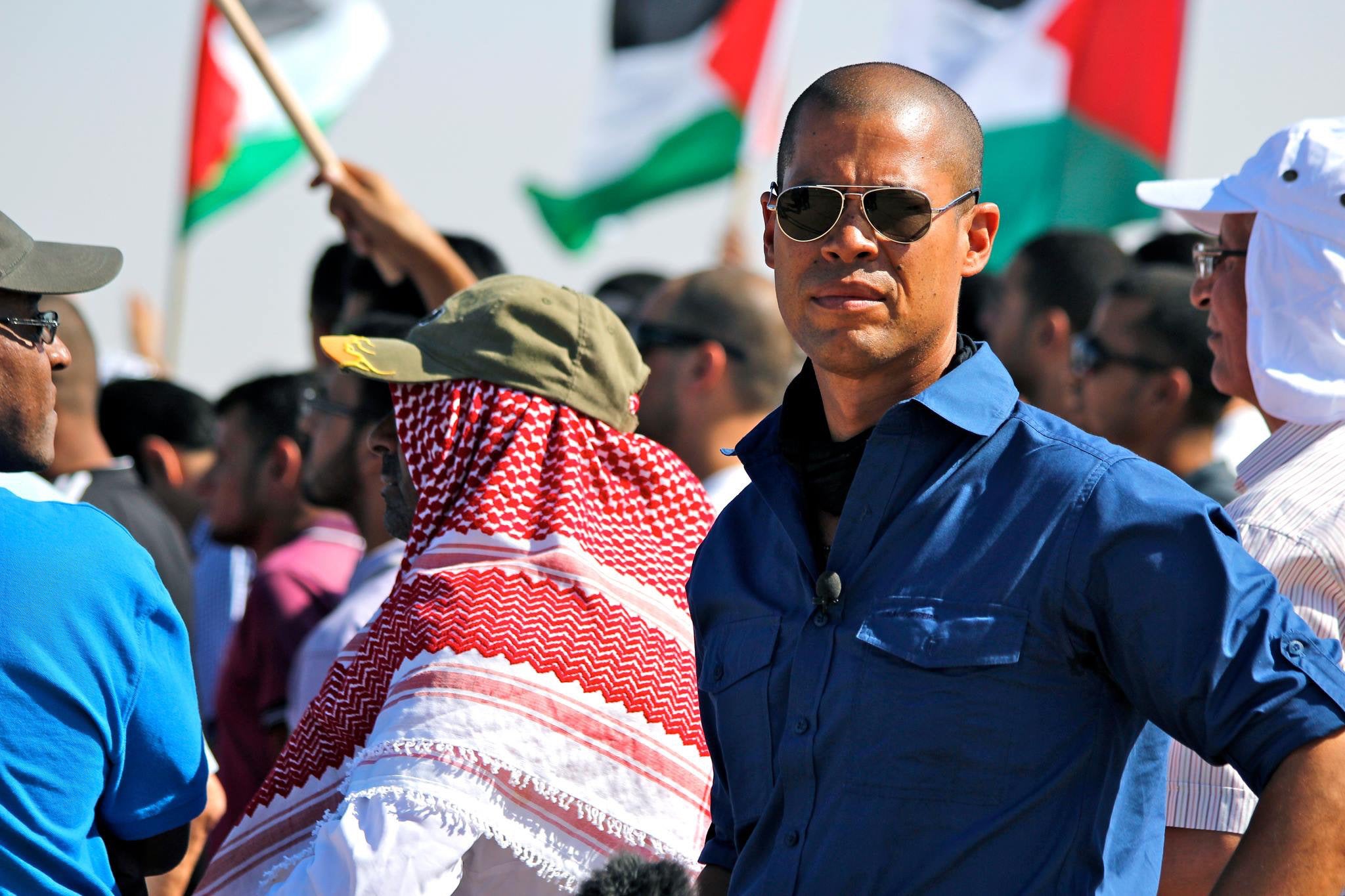
Duthiers’ reminiscing called to mind another anecdote: When covering former president of Liberia and convicted war criminal Charles Taylor’s trial, a government official said to Duthiers and his producer, “Journalists: Your AK-47 is your pen.”
It underscored the responsibility Duthiers carries and the risk he bears.
“Your life could be in danger whether you’re in the United States or abroad,” Duthiers says. “I tell young people that the role journalism plays in society places you under constant threat. You need to be aware that your life is at risk.
“The crowd could turn against you, and the next thing you know, you’re running for your life. You need to take responsibility and strive mightily.”
The walls of Duthiers’ office are covered with photos of people he’s reported on. The photos bear witness to the subjects’ suffering and tragedy — and joy. “I am honored that they allowed me to share their stories with others,” Duthiers says. In some cases, speaking their truth is a thing his subjects can’t do for themselves.
In 2016, in Haiti, in the aftermath of Hurricane Matthew, Duthiers was in a village totally flattened. He and his crew had finished filming and were packing up. A woman approached asking if Duthiers would write her name in his notebook. Others followed suit. “In writing their names down, I think they knew I would take their stories with me. They would not be forgotten,” Duthiers says. “I still take that notebook out from time to time and read their names.
“It’s a small thing I can do.”
“The First Amendment is on my side.”
Thomas Farragher ’73, Hon. ’17
“I grew up in the stereotypical Catholic family: nine kids, all altar boys, in a house with a crucifix on the wall. A lightning storm would find my mother sprinkling the house with holy water,” Tom Farragher says. So to be part of The Boston Globe Spotlight Team, which successfully sued the Catholic Church for sealed court records and broke the story about the protracted and systemic sexual abuse of children by serial pedophile priests in the Archdiocese of Boston, placed Farragher at odds with his spiritual teachers.
“January 1, 2002, a Sunday, the story was on page one of The Globe. I’m walking into 7 a.m. Mass and Monsignor Eugene McNamara says, ‘What are you doing to us?'”
The fourth estate, freedom of the press, had done battle with the Catholic Church in one of the most Catholic cities in the country. And won.
“Judge Constance M. Sweeney, who ruled that the records should come out, is the hero of this story. You saw two worlds clashing in that moment,” Farragher says. “Rome answers to nobody. I covered the court hearings where the church was arguing against the release. That ruling was game, set, and match. And those records were complete, lengthy, and damning.”
It was a win for freedom of the press and for the victims — and a sea change for Boston. Cardinal Bernard Law resigned in December 2002. Two-hundred-and-forty-nine archdiocesan priests and brothers were publicly accused of sexual abuse.
In the wake of The Globe’s revelations, the Catholic Church reported that more than 4,000 priests across the country had been accused of sexual abuse in the last 50 years.
The Spotlight Team won the 2003 Pulitzer Prize for Public Service. The
real winner in a story like this, though, is the public.
“The First Amendment is the backbone of what we do,” Farragher says. “There are public officials who are very careful about what they do, because they know there are people out there, like Spotlight, looking. When a mayor or police chief would tell me, ‘No, no, that’s not how it works,’ I would say, ‘The First Amendment is on my side.'”
In the 17 years since that Pulitzer Prize-winning Spotlight series, American newspapers have seen a precipitous drop in readership concurrent with exponential growth in internet media outlets. Competition for readers is fierce.
“Obviously it’s a splintered journalistic world now, but you look at the journalism The Globe is doing, and there’s no question hard, vigorous journalism is being committed all the time,” Farragher says. “We have protected the nuclear core of what we do, and it is resonating. More people are reading The Globe online than ever in my 42 years of doing this.
I am hopeful about what we do, but the journalism world I walked into just doesn’t exist anymore. There’s great journalism being produced every day,” Farragher continues. “People have to be more discerning about who they go to and who they trust.”
“The First Amendment allows the media to bring us an awareness of the world. What we do with that is up to us.”
Betty J. Cotter
Betty J. Cotter, a journalist and part-time faculty member in the Harrington School’s Department of Writing and Rhetoric, brings 30 years of reporting and editing experience to her journalism classes. “The First Amendment allows the media to bring us an awareness of the world. What we do with that is up to us,” Cotter says. “We can’t have the media acting as a check on government, which is what it does as the Fourth Estate, without the First Amendment. And when the public undermines or trivializes the media, or doesn’t believe the media, that whole relationship of checks and balances gets disrupted.”
Cotter knows firsthand the power of the First Amendment. When a student journalist at Keene State College in the late 1970s and early ’80s, she sued the college demanding the release of the college’s security logs when rumors of sexual assault on campus surfaced. Using advertising funds, the student newspaper then hired a First Amendment expert, a lawyer, to represent Cotter at the hearing. The presiding judge ruled there was enough evidence to move forward with a trial. A compromise was reached, and the student newspaper gained access to police logs.
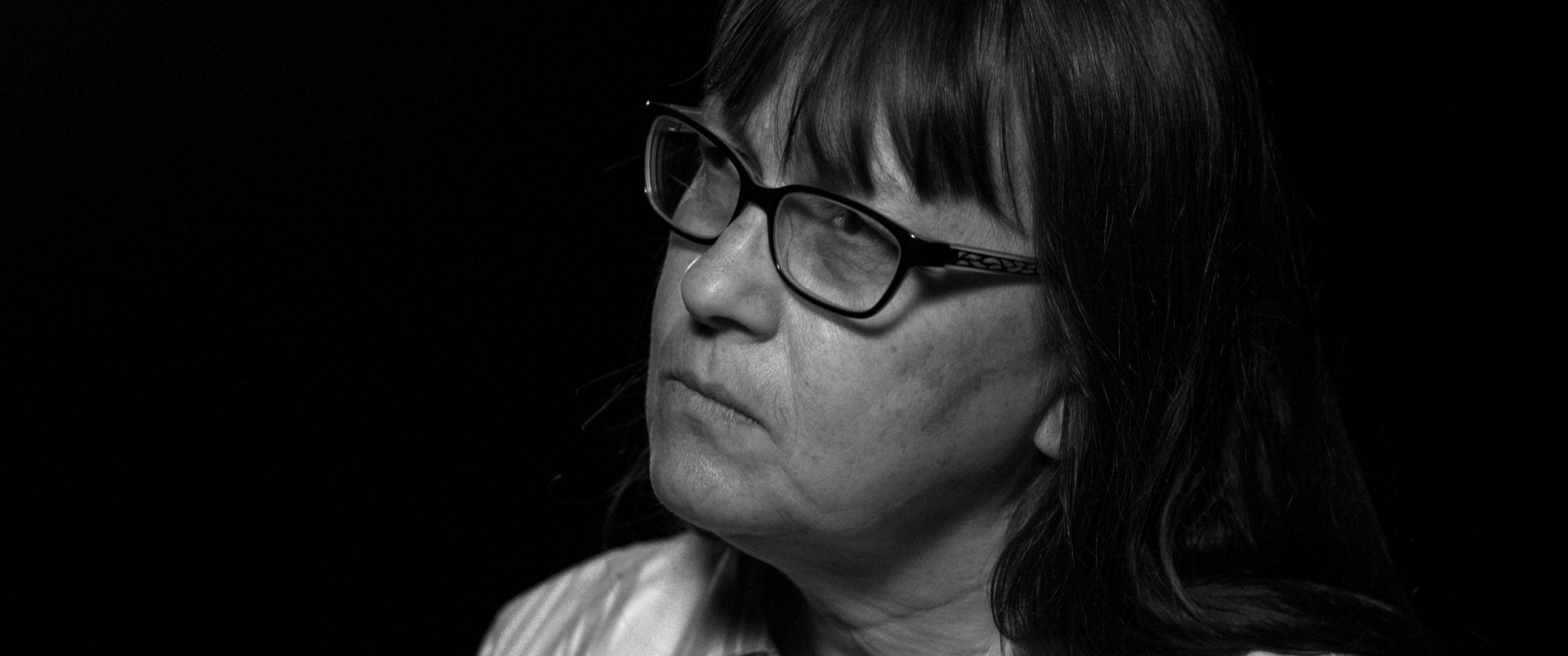
Cotter encourages her students to apply the lessons of her classroom to real-world problems by writing letters to the editors of local newspapers on issues of importance to them. If a student in her argumentation class gets a letter to the editor published, it’s a 100 on their midterm.
“It’s incentive to use the rhetorical devices they’ve studied. I want my students to have real-world skills with which to express themselves and to apply what they’ve learned to think about an issue and make an argument,” Cotter says. “Getting published is empowering. You can see the students change over the course of the semester.
“Students begin to see themselves differently: as writers who can make a difference. It’s the First Amendment in action.”
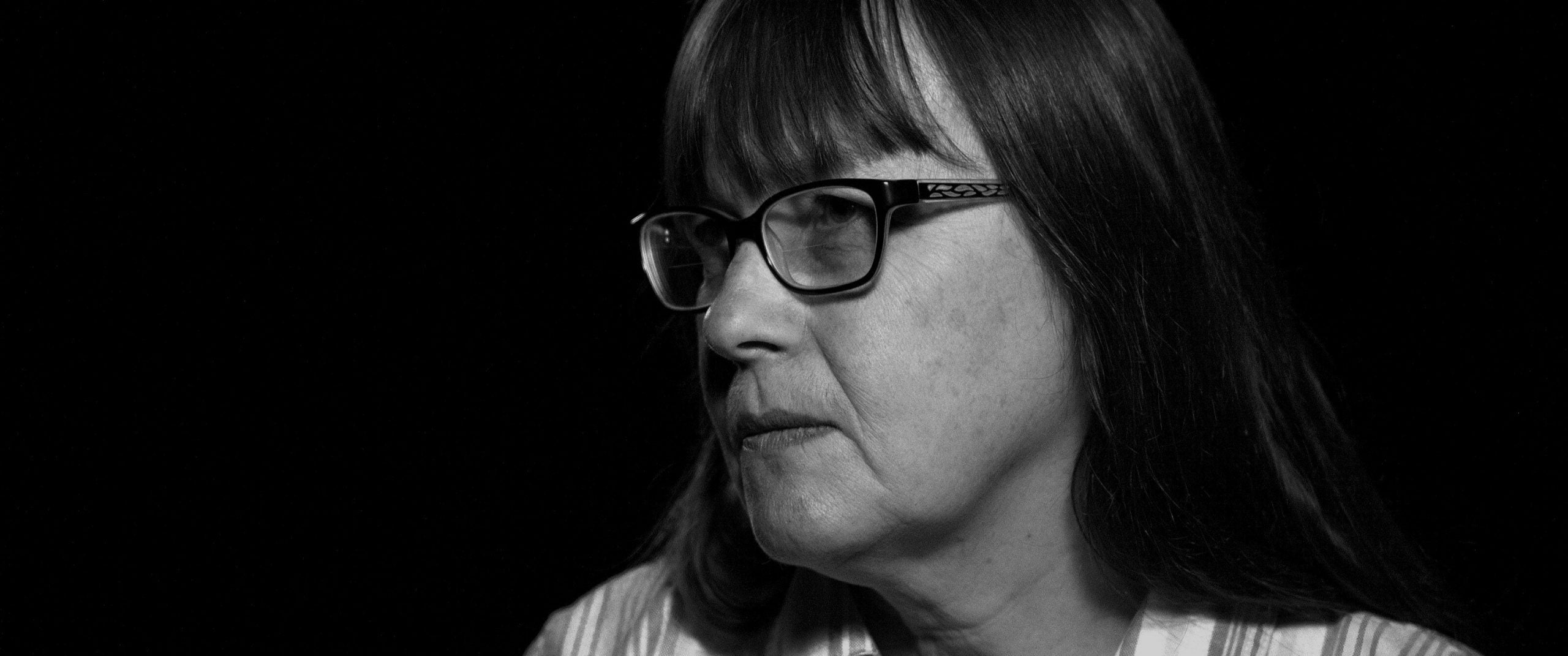
“We are facing a real existential threat.”
Laurie White ’81
It was 1984 on a hot July afternoon in Providence, when, at the wake of legendary New England mafia crime boss Raymond Loreda Salvatore Patriarca Sr., two men exchanged a greeting and a rose. The gesture conveyed a profound respect that stunned the law enforcement officers observing. It’s not every day that you see mob bosses treating journalists with deference.
What witnesses saw was an exchange between new New England crime boss Raymond Patriarca Jr. and investigative broadcast journalist Jim Taricani, Hon. ’18. “Junior,” as Patriarca Jr. was known, had invited Taricani to his father’s wake and presented him with the rose.
It was a mark of his father’s respect, Patriarca Jr. said.
“People understood Jim had a job to do, and they knew if he were covering the story, they would be treated fairly,” says his widow Laurie White, who is president of the Greater Providence Chamber of Commerce. “But to have the mob boss’s son actually invite him to the wake! The FBI and the State Police and other law enforcement were watching the funeral home to see who went in, and when they saw him go in there, they said, ‘How the hell did you get in? Tell us who was in there.'”
Taricani declined. His ethics wouldn’t allow it. Twenty years later, Taricani would deny law enforcement a second time, refusing to reveal a source who leaked him an FBI surveillance tape. For this, Taricani was held in civil contempt of court by a federal judge and sentenced to six months’ home confinement. The case turned Taricani, already a legend among journalists, into the face of the free press. He traveled the country lecturing on the First Amendment, the federal shield law, and the Free Flow of Information Act, even testifying for the bill before Congress in 2007. The Edward R. Murrow Award-winner for investigative journalism, Taricani received the prestigious Yankee Quill Award from the New England Newspaper and Press Association in 2007.
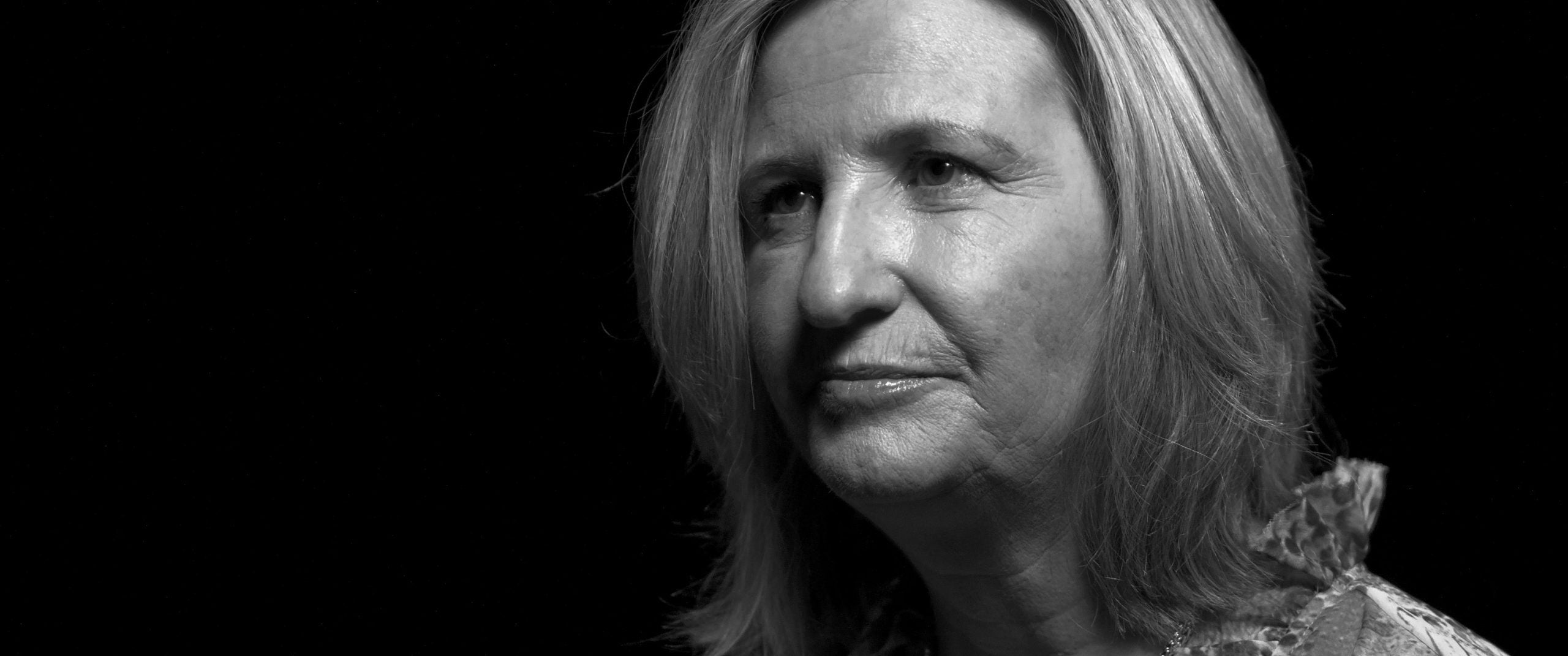
This year, URI will launch the Taricani Lecture Series on First Amendment Rights, a series established by Laurie White, which has received support from alumni and friends who are interested in First Amendment issues and in sustaining Taricani’s legacy.
“After Jim’s passing, this concept of how to keep his work as a professional journalist alive revolved around the notion of how do we, during this particularly troubling time in our history, understand and appreciate the importance of the First Amendment and the freedoms afforded under it, particularly the rights of the press,” White says. “We want to keep that alive and inspire the next generation of ethical and responsible journalists — to continue to do that in a way that reflects our belief in our institutions and our democracy and our belief that journalists serve an essential role in our society.
“We are facing a real existential threat — the threat of powerful institutions to suppress the news,” White says. “The role of the journalist is to speak the truth and perform a watchdog function for the public.
“There is a need for the professional journalist to be protected.”
Stories of the First Amendment in Action Part 2
Bearing Witness
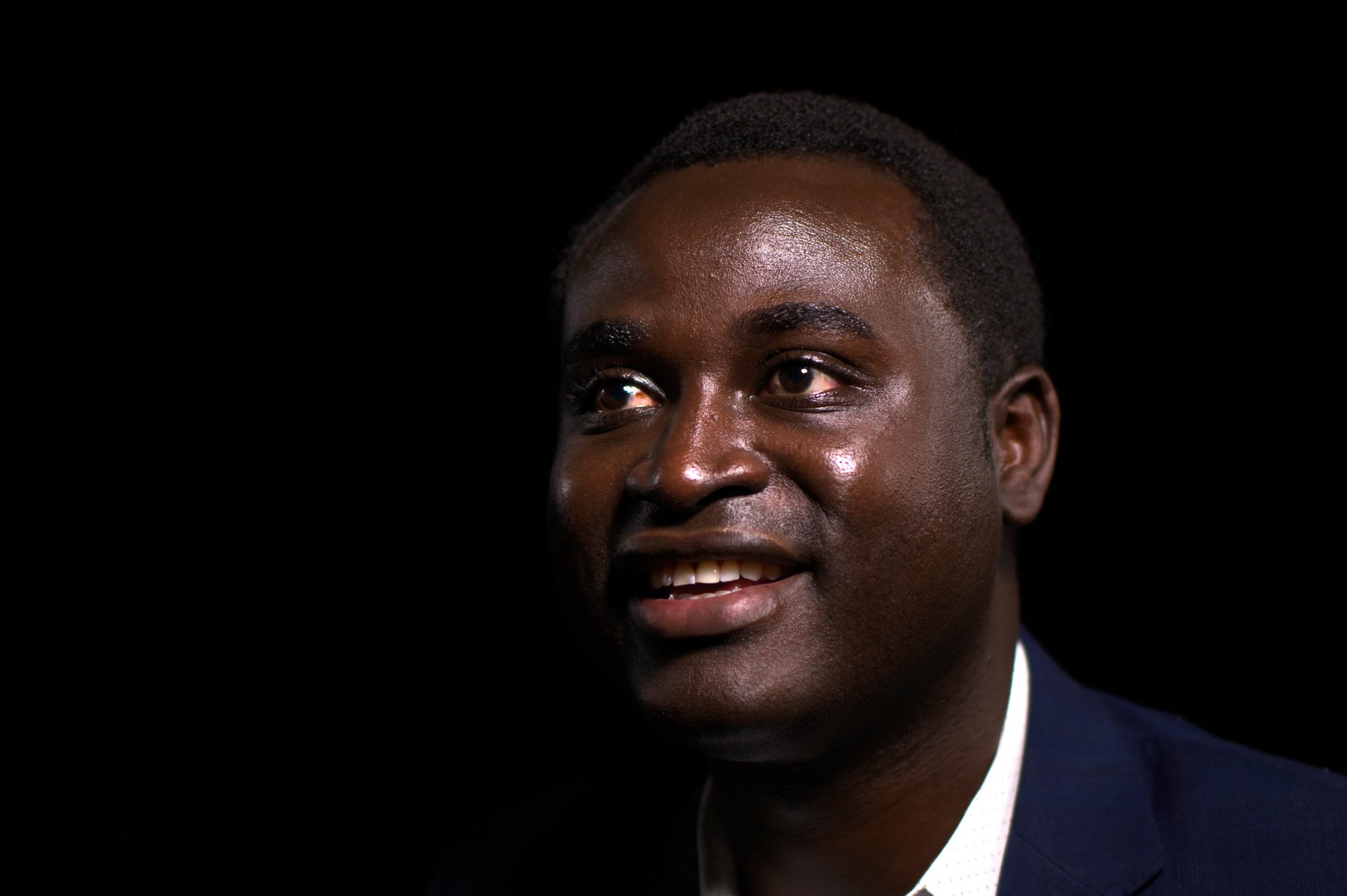
— Omar Bah ’10
The First Amendment illustrates how the absence of a thing leaves a mark. For those who don’t have its protections, that mark might be borne on the body, for others, the mind.
The stories of Omar Bah ’10 and Lorén Spears ’89, Hon ’17, highlight what life without the First Amendment can look like.
“I thought I was going to die.”
Omar Bah ’10
The Gambia. 2001. Beaten, bloody, and drifting in and out of consciousness, 21-year-old journalist Omar Bah lay curled in the fetal position, awaiting death in a cell so small he couldn’t stretch his legs. He had been writing articles criticizing the country’s dictator, Yahya Jammeh, when he was taken into custody by soldiers. Over the course of a day, Bah had been stabbed in the back with bayonets and his head bludgeoned with the butt of an AK-47. “They made a game of lifting me and throwing me in the air, and as I came down they kicked me and hit me with their gun butts,” Bah recalls.
The cell was dark, fetid, and so hot that Bah couldn’t tell if he was soaked in sweat or blood. Rats, geckos, and other lizards skittered across his body while mosquitoes fed on him.
“My bayonet wounds were deep and swelling,” Bah recalls. “Soldiers would look in and see if I was still alive, start kicking and hitting me, then leave and lock the door.
“I thought I was going to die.”
But people had witnessed the torture. “The soldiers did not care to hide what they were doing, because it was condoned,” Bah says.
After being held for the day, Bah was released because of public outcry — but that’s where the support ended in Jammeh’s Gambia. “You couldn’t say anything; you couldn’t do anything. No hospital would treat me; I was on my own.
“I get very angry when I speak about it.”
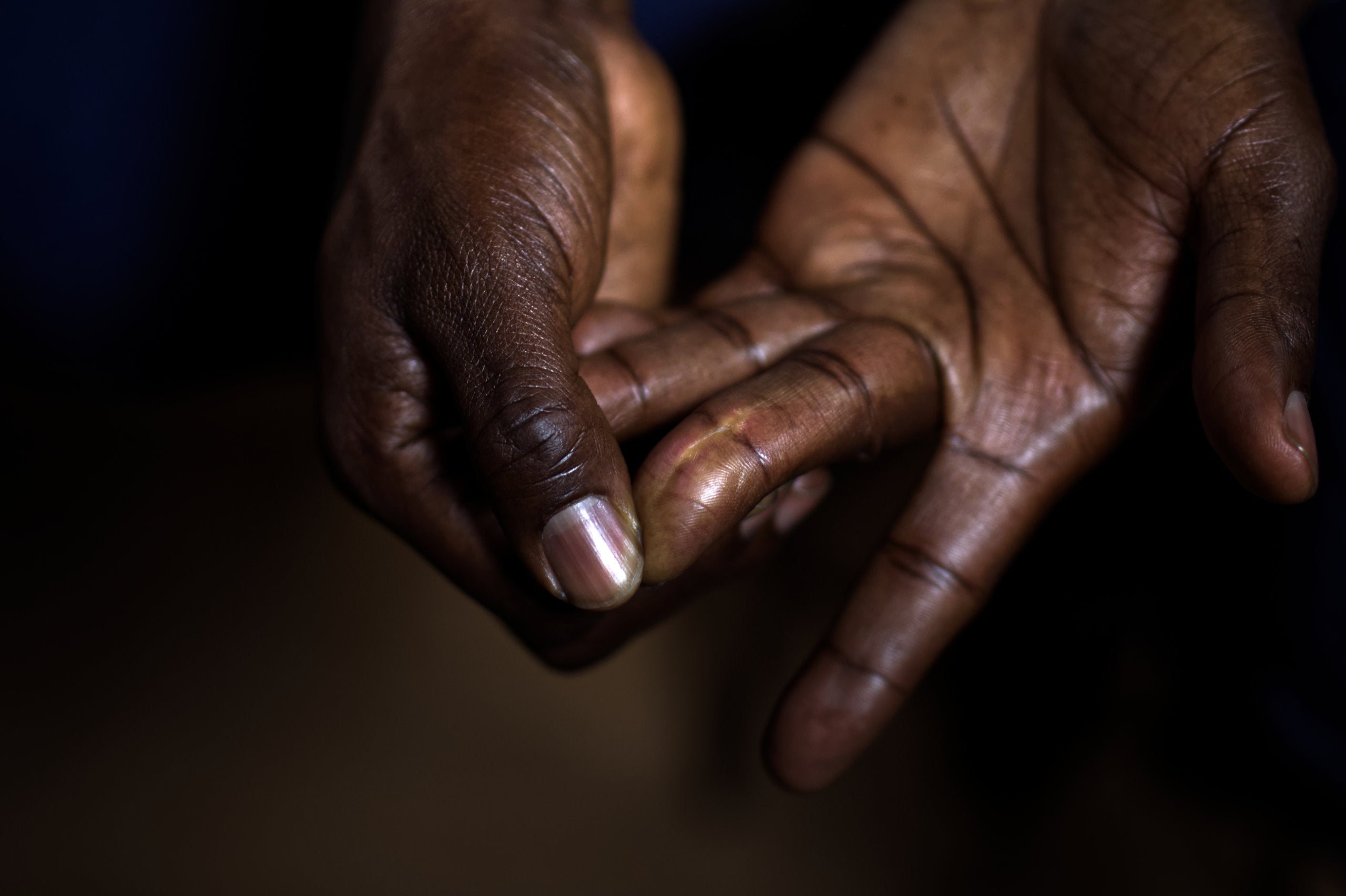
Still, Bah returned to reporting. “I could not be quiet,” he says. In 2006, though, he received a tip that Jammeh’s men were coming for him again. Within hours Bah had fled his homeland for Senegal but was detained at the border by a soldier. Arms raised in surrender, Bah was horrified to see that the soldier was a childhood friend. His friend’s face registered a similar surprise and horror. Then, a moment of grace. The friend let him go and likely saved Bah’s life. Bah arrived in Rhode Island a year later and became a United States citizen in 2012.
“Now I can say whatever I want without having to look over my shoulder,” says Bah. “I think about it every day.”
In 2010, Bah earned his bachelor’s in communication studies from URI and in 2015 opened the Refugee Dream Center in Providence. It serves about 300 people a year and is “meant to empower and lift them to have a voice,” Bah says. Refugees are offered help finding housing, jobs, trauma counseling, and health care. “The second part of the mission is advocacy. It’s a lot of work but very rewarding,” Bah says.
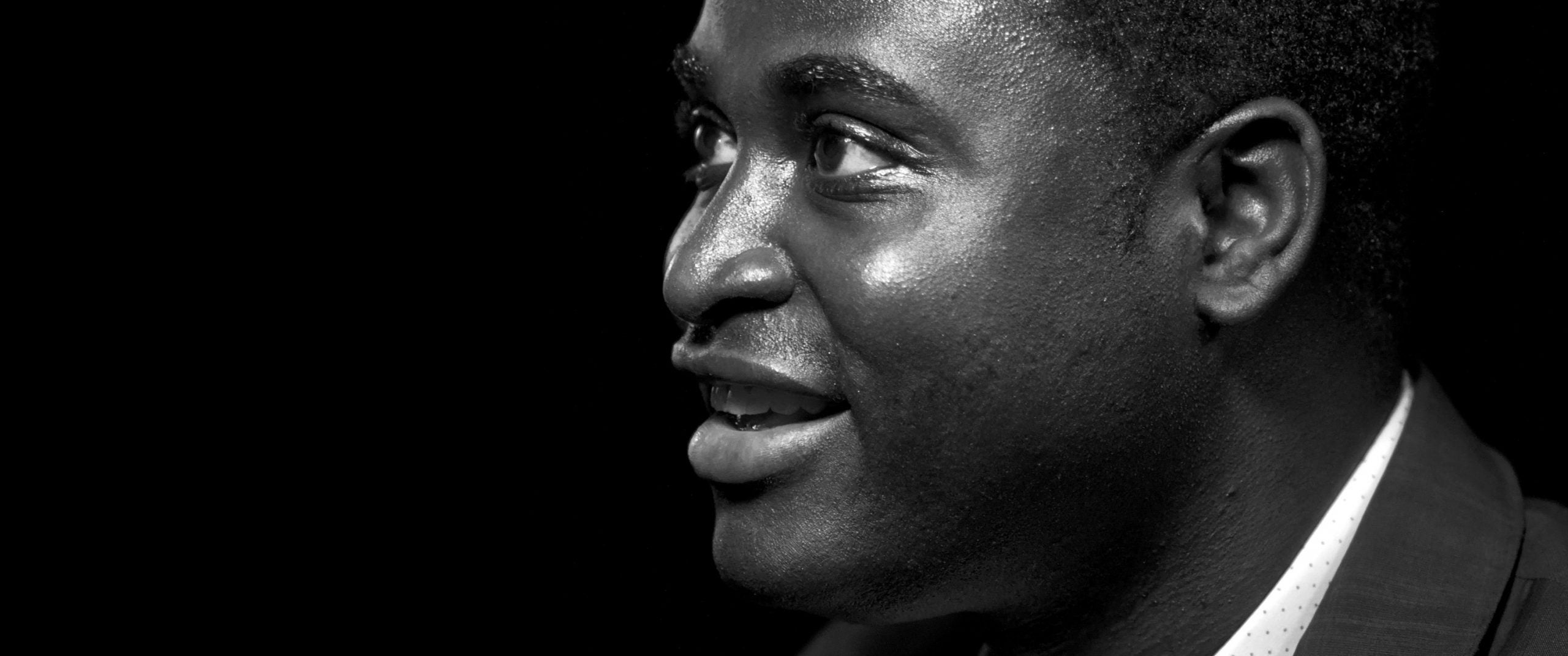
Bah now lives in South Providence with his wife and two young sons. He will earn his Ph.D. in August. Having grown up in a mud hut in a village where women carried water in jars on their heads and the village ambulance was a donkey cart, Bah is intent on teaching his children that opportunity is possible in his adopted country. “They know they are lucky to live in a country where they are not afraid to speak up and enjoy freedoms of every kind,” he says.
“I want to live a life of example to them — one in which education is highly valued.”
Bah’s younger boy is interested in social justice. “When we’re in the car, my son makes me stop when he sees a homeless person. He gives all of his money to the homeless,” Bah says. “Those actions make me cherish freedom even more. It is a gift and an opportunity to make a difference.”
Bah is quiet for a moment. It’s not easy to put into words such a turnabout of fortune. “That first day I set foot in the United States, I could look forward to what I would do in my life,” Bah says. “America permitted me freedom, opportunity, and a chance for a second life.
“People should use their rights as a catalyst for upward movement. They should exercise those rights in a civil society,” he says. “And agree to disagree. It’s OK. It’s good.”
“There are still attacks on our sovereignty.”
Lorén Spears ’89, Hon ’17
Lorén Spears, executive director of the Tomaquag Museum and member of the Narragansett Indian Tribe, possesses a graciousness and patience 400 years in the cultivation when explaining that authors of the First Amendment ignored Indigenous people. First, she must dispel misconceptions about Indigenous people. Second, augment American history to include Indigenous people. Third, explain what it is to be Indigenous in modern society.
The country’s formation depended upon the appropriation of indigenous land, a.k.a. theft, which required the vilification, dehumanization, and victimization of Indigenous people, Spears says. “This notion of believing you have the right to do such a thing, to subjugate and dehumanize and victimize other human beings for your own goals.” Spears shakes her head. “The First Amendment was not written for those being displaced, dispossessed, or violently (attacked) through genocide, war, and enslavement.”
Resistance took many forms. Wars were waged — on battlefields, in classrooms, churches, and courtrooms. The federal government sought to deracinate Indigenous people through conversion to Christianity, a European model of education, even detribalization. “Education was used against us as an act of war,” Spears says. “To strip us of everything we knew, to take away our language, our religion, our cultures, to disrupt our families and communities, and to break apart our political structures in order to force us to adopt or assimilate into Eurocentric concepts of community.”
Full access to the Bill of Rights for Indigenous people is relatively new. The Indian Civil Rights Act was passed just 52 years ago. Religious freedom came 10 years later with the passage of the American Indian Religious Freedom Act in 1978.
“When you think about historical trauma, this is ongoing,” Spears says. “There are still attacks on our sovereignty.”
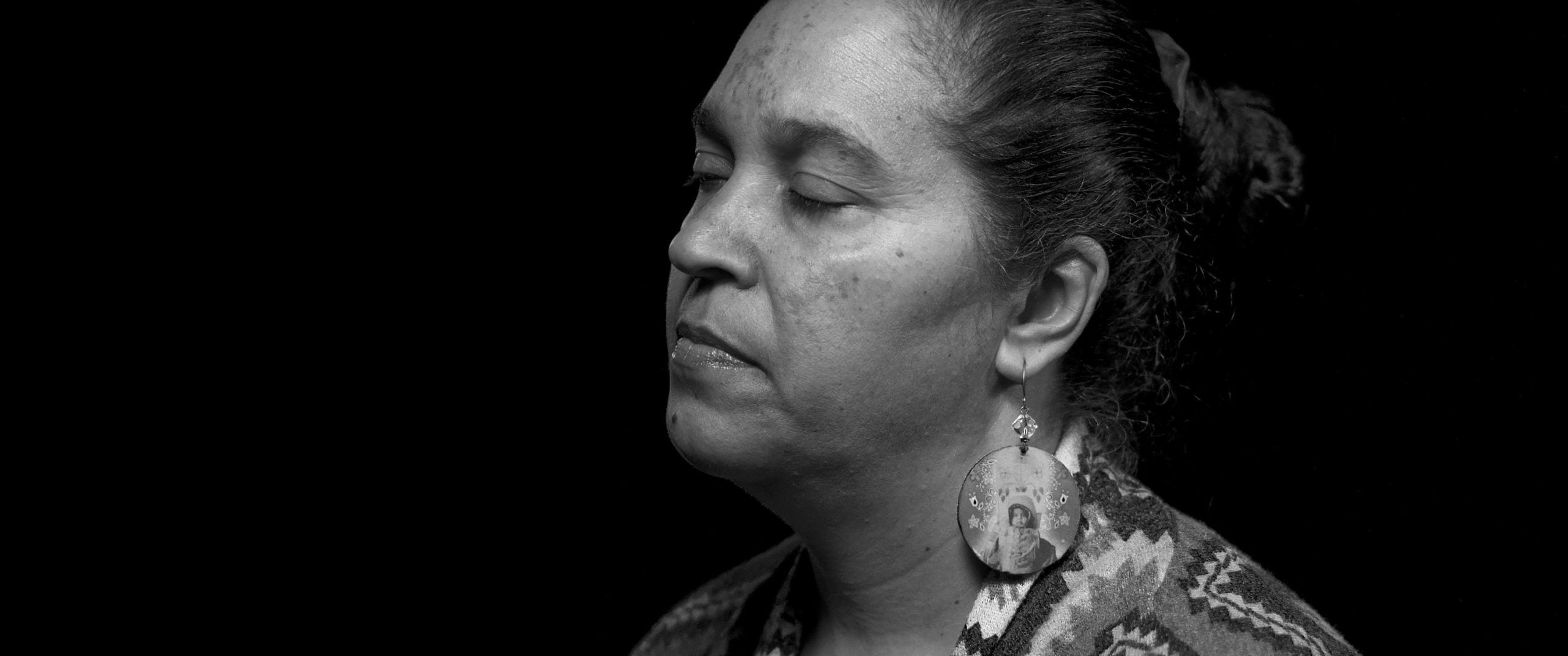
Spears and the Tomaquag Museum continue the fight through educational programming, activism, strategic partnerships with the Indigenous Empowerment Network, and other efforts to “create opportunity, uplift native voices, and honor native cultural knowledge,” Spears says.
“There is no Rhode Island history without Narragansett, Niantic, and other Indigenous people’s history,” Spears says. “And there is no such thing as United States history without Indigenous people’s history.”
“We’re still reclaiming our rights,” Spears adds. “We still don’t often feel we’re heard. We’re not always at the table with the people that have the wealth, the power, and the control. So we’re still pursuing these rights and these freedoms that are guaranteed under the Constitution.”
Stories of the First Amendment in Action Part 3
Compelling Creativity
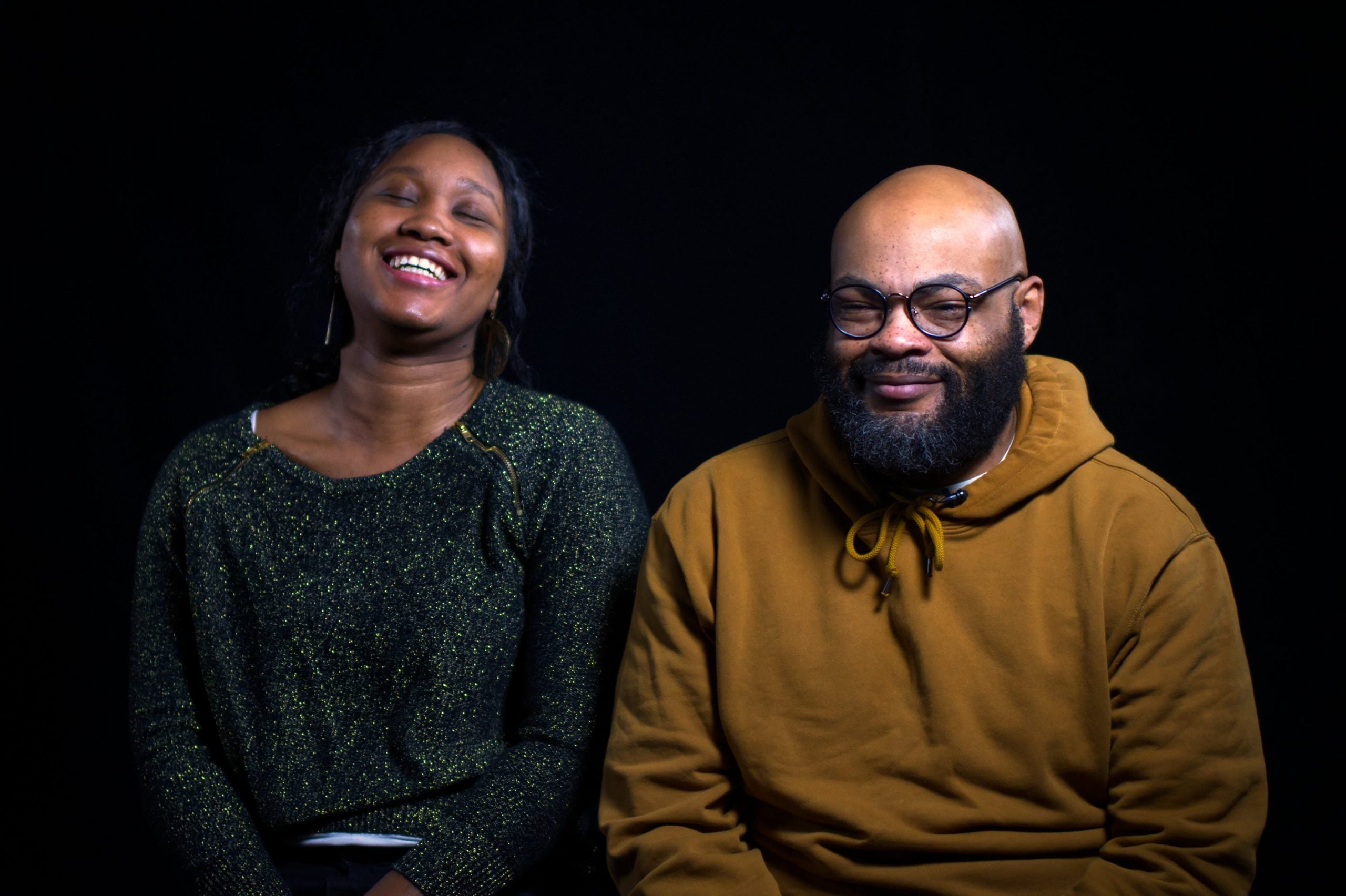
“I learned early on that I could stand up for myself.”
— Afua Ansong (left)
“My goal is to speak truth to power.”
—Jerriod Avant
How does the First Amendment inspire musicians and poets? Dissent and protest compel creativity.
Historically, in times of turbulence, artists encoded their work, injecting double meaning into poems, paintings, songs, even quilts. Contemporary artists at URI Afua Ansong, Emmett Goods, and Jerriod Avant honor the influence of their predecessors and create work that speaks to social justice.
“I learned early on that I could stand up for myself.”
Afua Ansong
Afua Ansong came to poetry with anger.
As a 12-year-old immigrant from Ghana, Ansong felt betrayed. In her home country, parents do not involve their children in decision-making, so she arrived in America, unaware that she would be staying for good. “Poetry became the medium through which I could express myself,” says Ansong, now a Ph.D. student. “I had lost my friends, my language, most of my family, and I had to make a new life. Poetry was a space to begin again.
“Moving to the United States helped me to think deeply about who I am and who I want to be. I learned early on that I could stand up for myself, and to do that in a creative way was amazing to me.”
Ansong’s 2019 poetry collection American Mercy explores ideas of identity, immigration, and ownership.
“My book is thinking about ways in which we own things,” Ansong says. “The ways in which America owns its people, or its people own America — and the ways in which we create borders. I’m thinking about the immigrant and the American and how we can come together peacefully.”
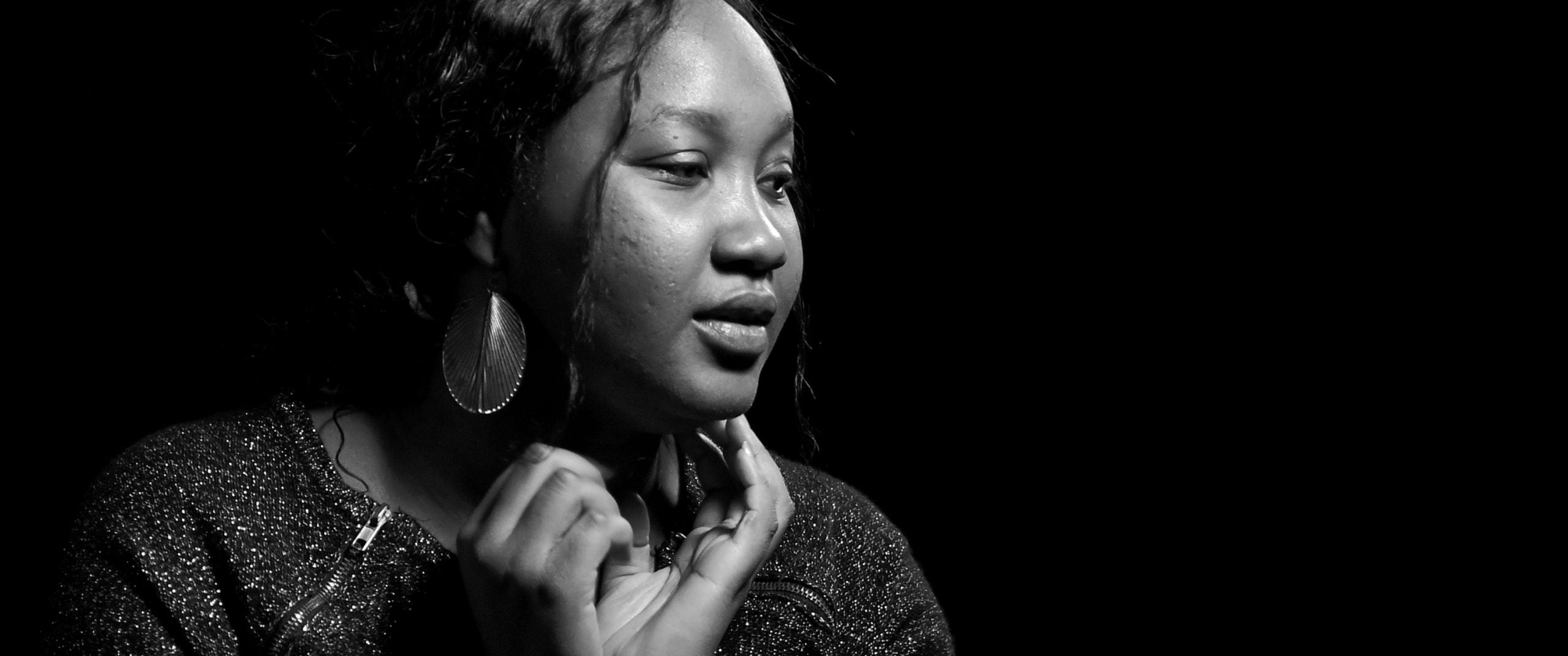
Ansong is currently working on a project called Postcards to Phyllis Wheatley. Wheatley also came to America from West Africa as a child but on a slave ship in 1761. Remarkably, she received a formal education, learning Greek and Latin in addition to English. Wheatley, too, turned to poetry, publishing while still in her teens. Her most famous poem, “On Being Brought From Africa to America,” takes aim at the hypocrisy of being a Christian and a slave owner and uses veiled language to do so.
“I think of myself as a kind of a Phyllis Wheatley. I think of her creating a voice for herself in the United States as an enslaved black woman,” Ansong says. “Being an immigrant coming from Ghana, West Africa, and relocating to the United States, I see the First Amendment as giving me the opportunity to represent myself, my people, and my changing identity.”
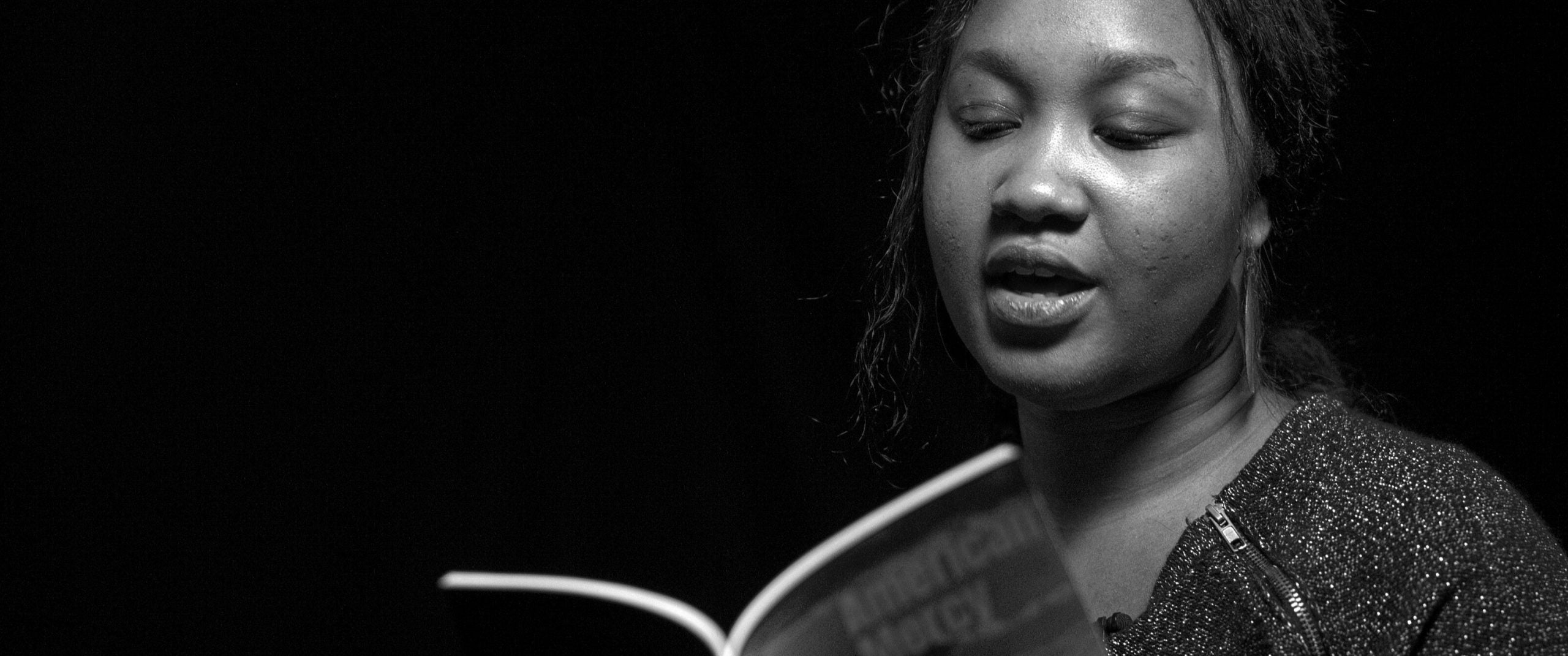
“You can say something in a song.”
Emmett Goods
Look to art and see what genius emerges in turbulent times, says Emmett Goods, lecturer in jazz studies, who teaches applied jazz and trombone as well as a number of music history classes at URI including Music as a Form of Social Protest, and the History of Hip-Hop and Black American Culture.
Art affords cover. “You can say something in a song that you wouldn’t necessarily say with your regular voice in a crowd,” Goods says. “If you can put your deepest, most heartfelt feelings to some chords and apply a melody to it, now you’ve provided this palette by which you can express what it is that you really feel — and give people an opportunity to kind of step back and know that this is art and this is artistic expression.”
Art transcends human beings’ general unwillingness to listen to ideas they find abrasive, Goods says. “We need texture to soften the blow of the reality of hearing every person’s truth. When you put your protest into music, or you apply your deepest thoughts to music, you’ve taken a lot of the pressure off of somebody who is receiving your truth.”
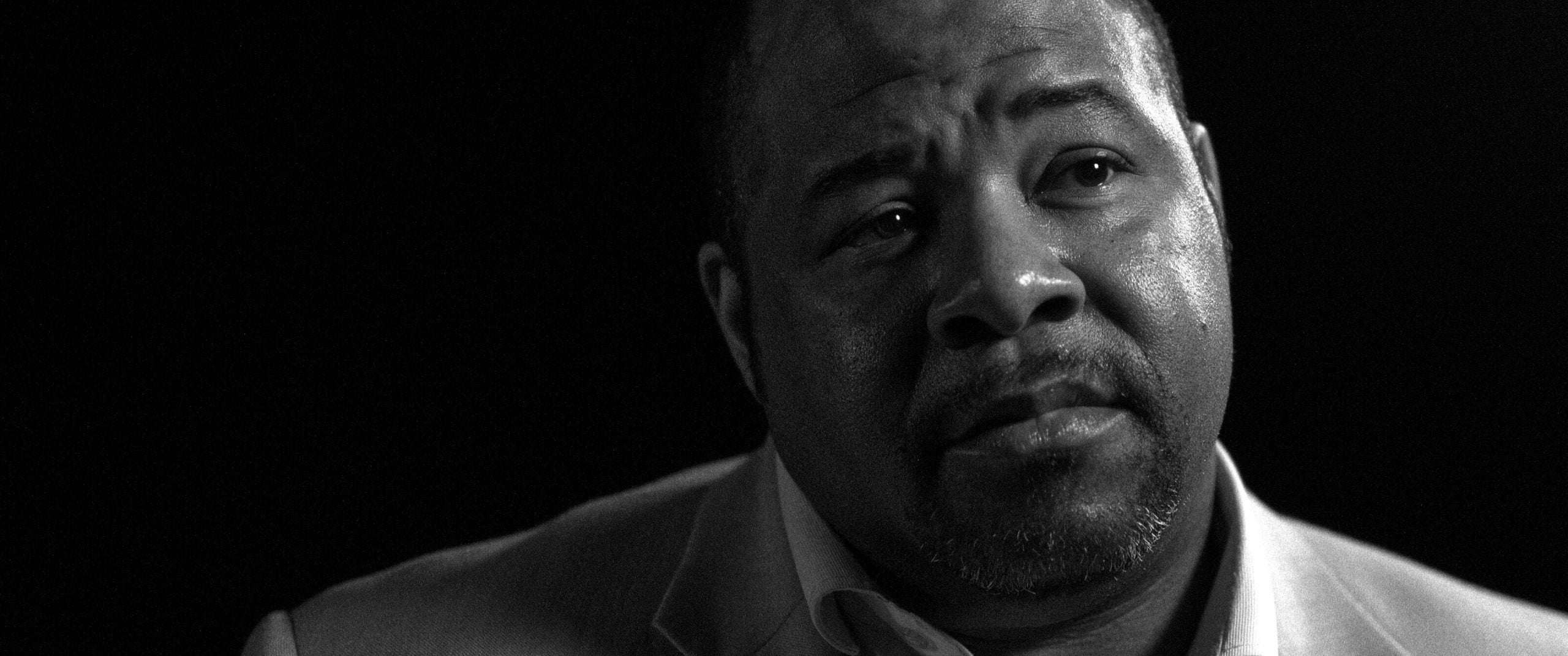
In this way, music preserves and propels the message of Wheatley, Billie Holiday, Cab Calloway, and others, Goods says. He pays his respects to his influences in the work he does as a historian, musician, and educator.
“The First Amendment means that I live in a country where I have the freedom to say what I think in my deepest heart of hearts,” Goods says, “but I have the responsibility to take care with how I say it and to whom I say it so that I can live in peace and harmony with those Americans who may not think and feel the way I do.”
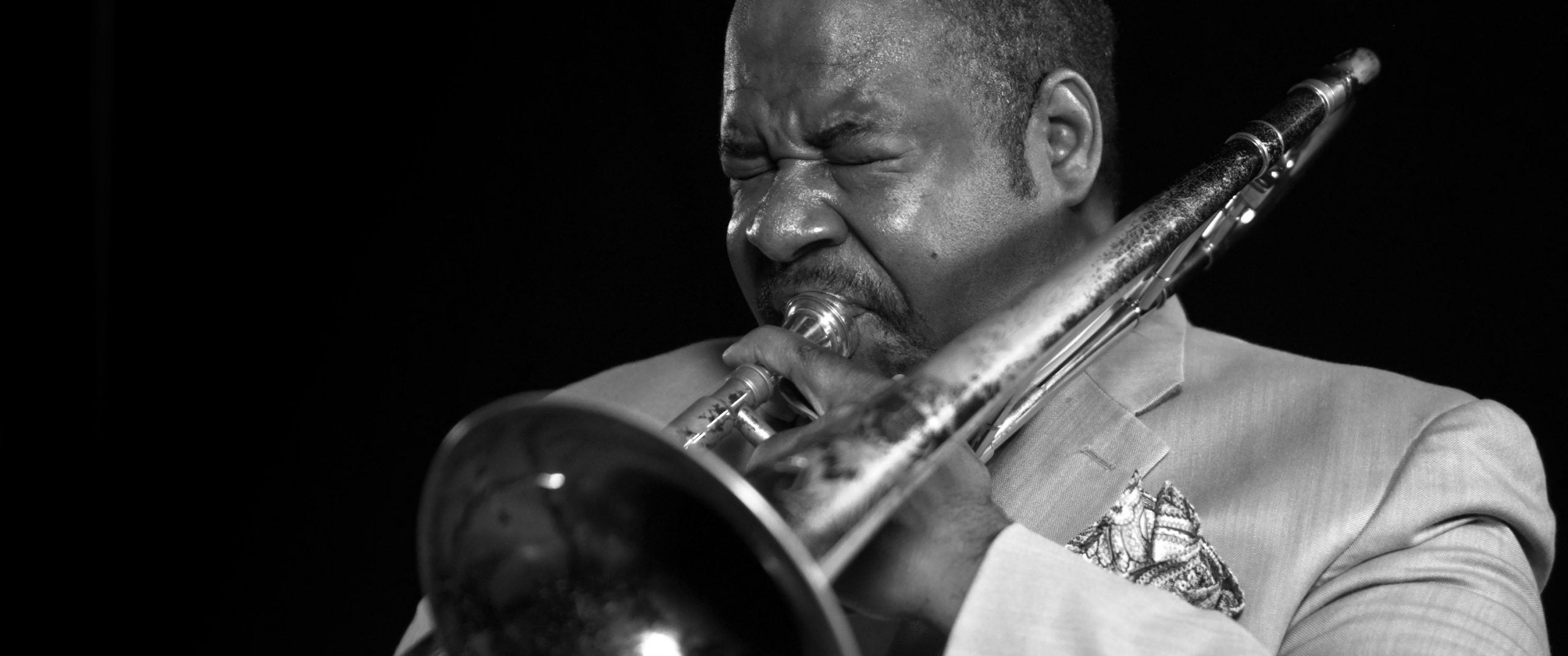
“My goal is to speak truth to power.”
Jerriod Avant
When asked about influences on his poetry, Ph.D. student Jerriod Avant looks to his father.
“I have to start at home with my father. He was a local politician. We did a lot of campaigning, door to door, talking with people in the community, watching him give speeches at churches. During Black History Month, he would deliver portions of Doctor King’s ‘I Have a Dream Speech.’ I was encouraged to speak in church, to speak in school, and I became used to being in front of an audience and to make good use of that opportunity.
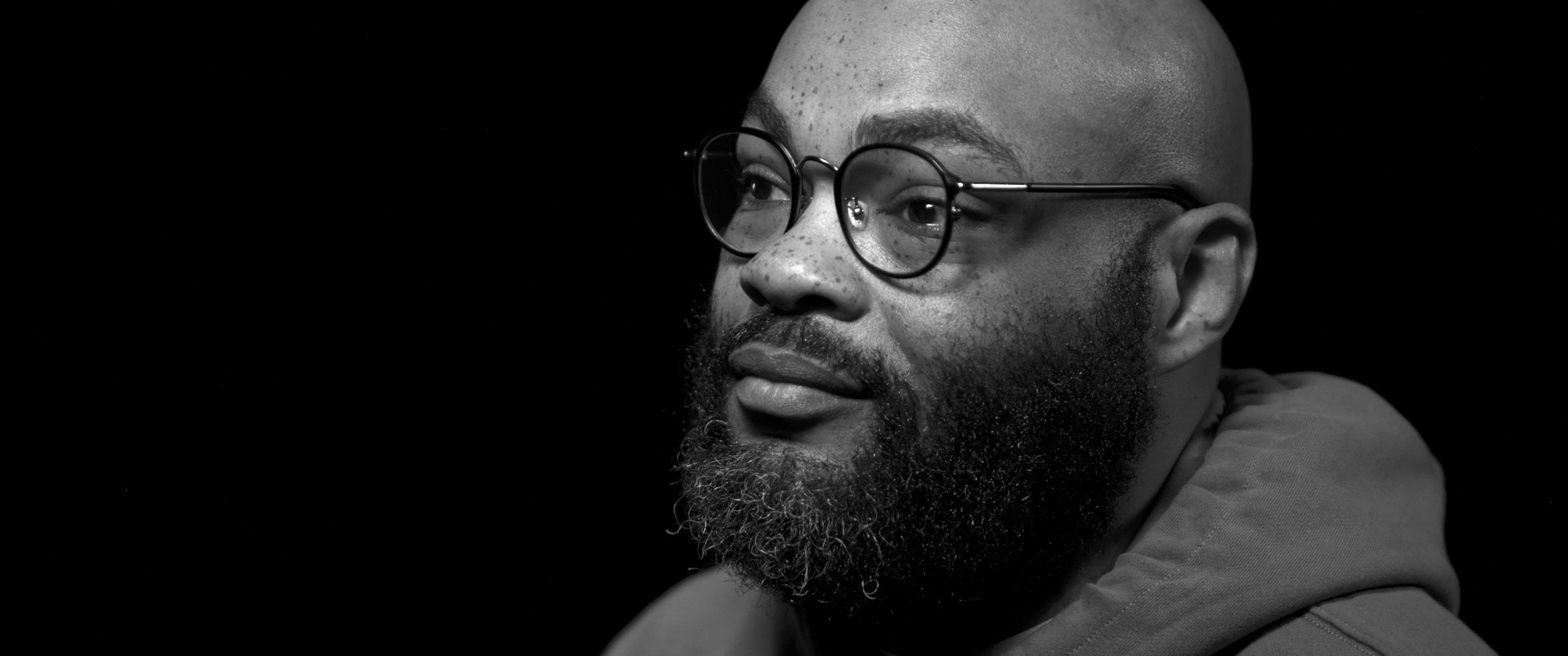
“I think about Martin Luther King Jr.’s speeches and how artful and intentional he was with his language to tear down these systems of oppression that plagued black people for decades, for centuries. And I’m influenced by Jimmy Hendrix’s 1969 edition of ‘The Star Spangled Banner’ at Woodstock,'” Avant says. “How transgressive it was and Hendrix’s relationship to that anthem. So when I go to the page, or when I’m thinking about poems, I’m always trying to tear something down, or I’m punching up from a place of grievance, from a place of oppression, from some subjugated position that wants better.
“When I’m writing a poem, it doesn’t always sound like what you would hear or expect to hear from the canon,” Avant says. “A lot of times, I employ ways of speaking that don’t always obey rules of grammar or adhere to standard American diction. There’s a lot of dialect, a lot of misspeak, intentionally, to make a point to subvert the language in whatever way I can find to do it.
“My primary goal is to speak truth to power, to tear something down that’s not working.”
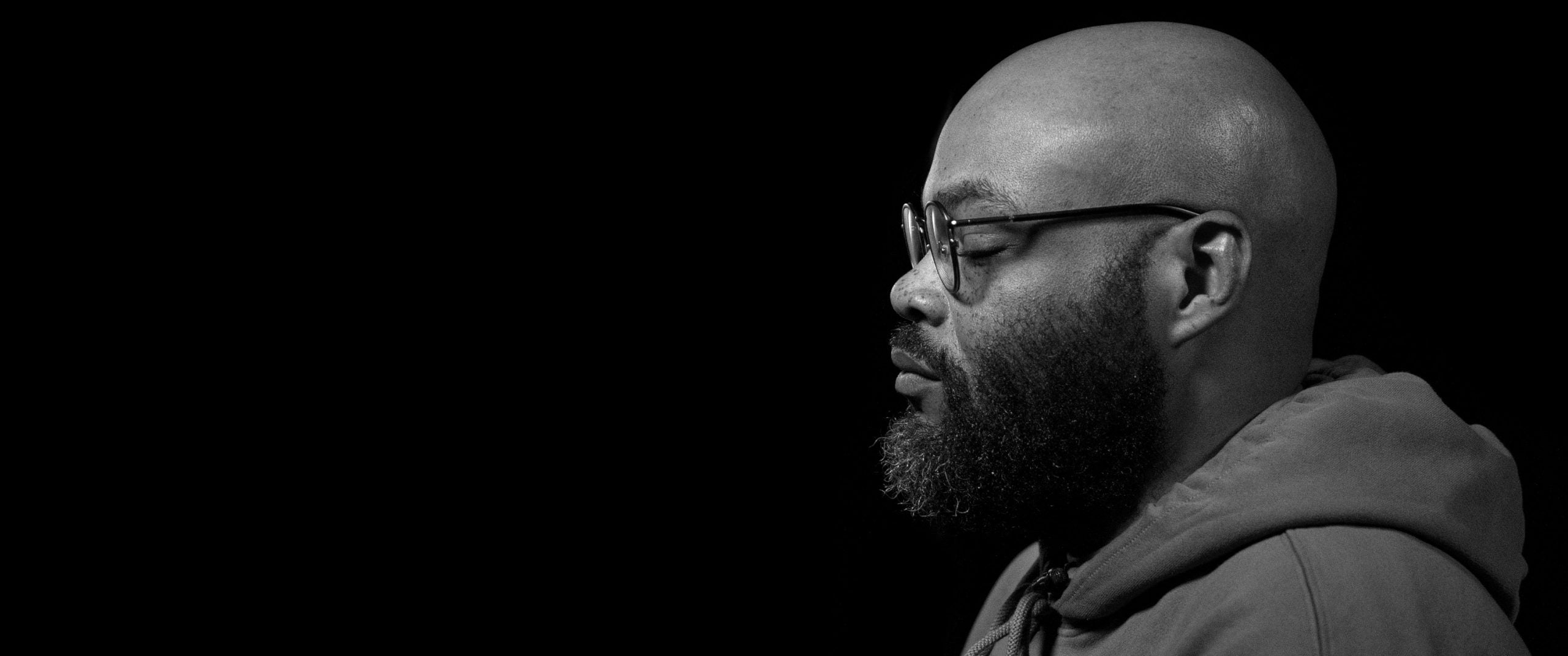
Stories of the First Amendment in Action Part 4
Taking Responsibility
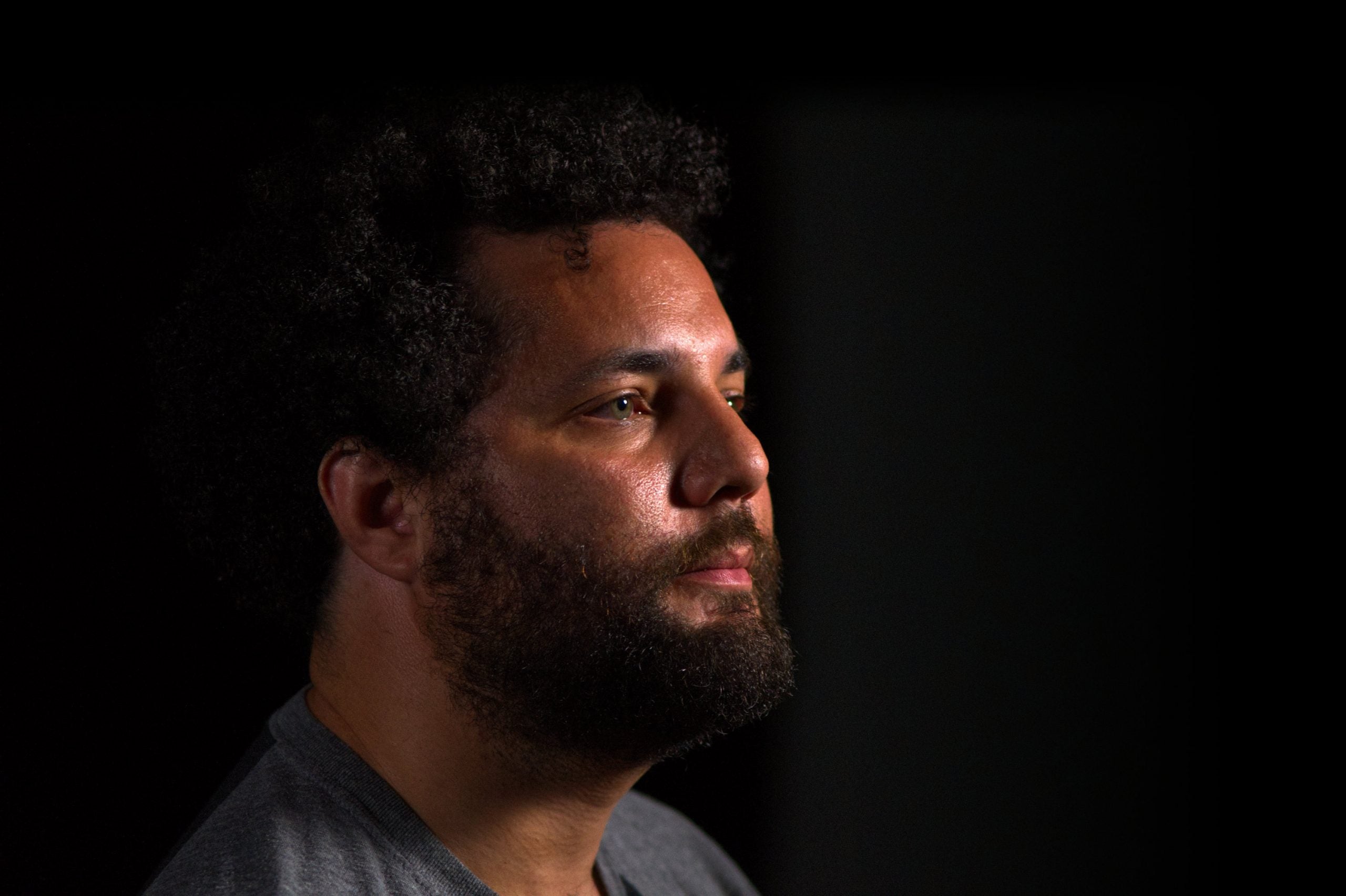
— Brendan Skip Mark
Why are URI faculty talking about the First Amendment? Because tenure is about academic freedom and servant leadership—not job security for life. Because students should be encouraged to be free thinkers. Because a state university has a responsibility to the taxpayers who support it.
Here faculty members Nasser Zawia, Jeremiah Dyehouse, James Haile III, Brendan Skip Mark, Christopher Parker, Carolyn Betensky, and John Pantalone weigh in on the First Amendment in action in their work and their classrooms.
“We should be the ones the public trusts.”
Nasser Zawia
Tenure carries responsibility, says Nasser Zawia, scientist and dean of the Graduate School.
“The First Amendment is very special to an academician because of tenure. Tenure was not designed to assure permanent job security but to protect academic freedom for faculty who want to speak truth to power and not fear for their jobs,” Zawia says. “We have faculty here who are tenured and secure but will not speak truth to power. People rely on academics to be unbiased, neutral judges who do the due diligence and scholarly work.
“We should be the ones the public trusts.”
“What we seek to impart is that individuals have a duty to construct reasonable, truthful arguments.”
Jeremiah Dyehouse
Students are quite aware of the speech-protected traditions, says Jeremiah Dyehouse, chair of the Harrington School’s Department of Writing and Rhetoric. “They know they have a right to their own voices and ideas.
“And what we seek to impart is that individuals have a duty to construct reasonable, truthful arguments. The difference between opinion and argument is a big one,” Dyehouse says. “I say to students, you can have any politics you like. We’re going to have different political opinions. Students are resilient once they understand that this is not about indoctrination.”
Learning argumentation is also an exercise in discernment, Dyehouse says. In his writing and rhetoric classes, he is looking to see gains made in cultural competency, pattern recognition, building a theoretical framework, and recognizing fallacious arguments.
“We are now in an era of participatory propaganda,” Dyehouse says. “We see ignorance perpetuating itself. We want our students to know about the information they’re consuming, to think with a scholarly, engaged, civic mind.”
“It is a revolutionary act to place a book in a student’s hands.”
James Haile III
Curiosity can be killer. Look to Socrates. Death by hemlock on charges of heresy and corrupting Athens’ youth.
Socrates was executed for speaking against the state, and speech critical of the government can be perceived as unpatriotic, putting the speaker at risk, notes James Haile, assistant professor in the Department of Philosophy. And yet the right to question authority defines and delineates Americans. These are the types of observations that propel Haile’s philosophy classes and prompt students to investigate competing — and controversial — ideas. What if, for instance, your rights are not acknowledged or recognized by the government? Do you have a right if nobody recognizes it?
“What does freedom of speech mean then?” Haile asks. “We have to have that conversation first.”
And how do you account for the disengaged or those who hold opinions not based in fact? Haile works to get students to own their views often by arguing from an unpopular viewpoint. “The younger generation doesn’t know, necessarily, what good information looks like,” he explains.
In an era in which anything can be published and passed off as fact, Haile employs the Socratic Method, challenging students’ assumptions by asking the big, difficult questions.
“Our role is to create a revolutionary space of engaging ideas,” Haile says. “There’s no freedom of speech if people are ignorant. Giving anybody any information is the role of an activist.
“It is a revolutionary act to place a book in a student’s hands.”
“It’s OK to be wrong.”
Brendan Skip Mark
Brendan Skip Mark, assistant professor in the Department of Political Science, throws a lot at his students; they talk of human rights, political economies, collective dissent and uprising, migration, immigration. And his students, he says, are increasingly aware of the polarization in this country around many of those issues. His response: “I encourage students to make arguments they themselves disagree with. I don’t think you understand an issue until you understand the other side.
“A large part of free speech is about listening,” Mark continues. “People must be allowed to say things you yourself fundamentally disagree with. “You have to get as many points of view as you can to be truly informed.
“And I tell them they have to be skeptical about what I say as well.”
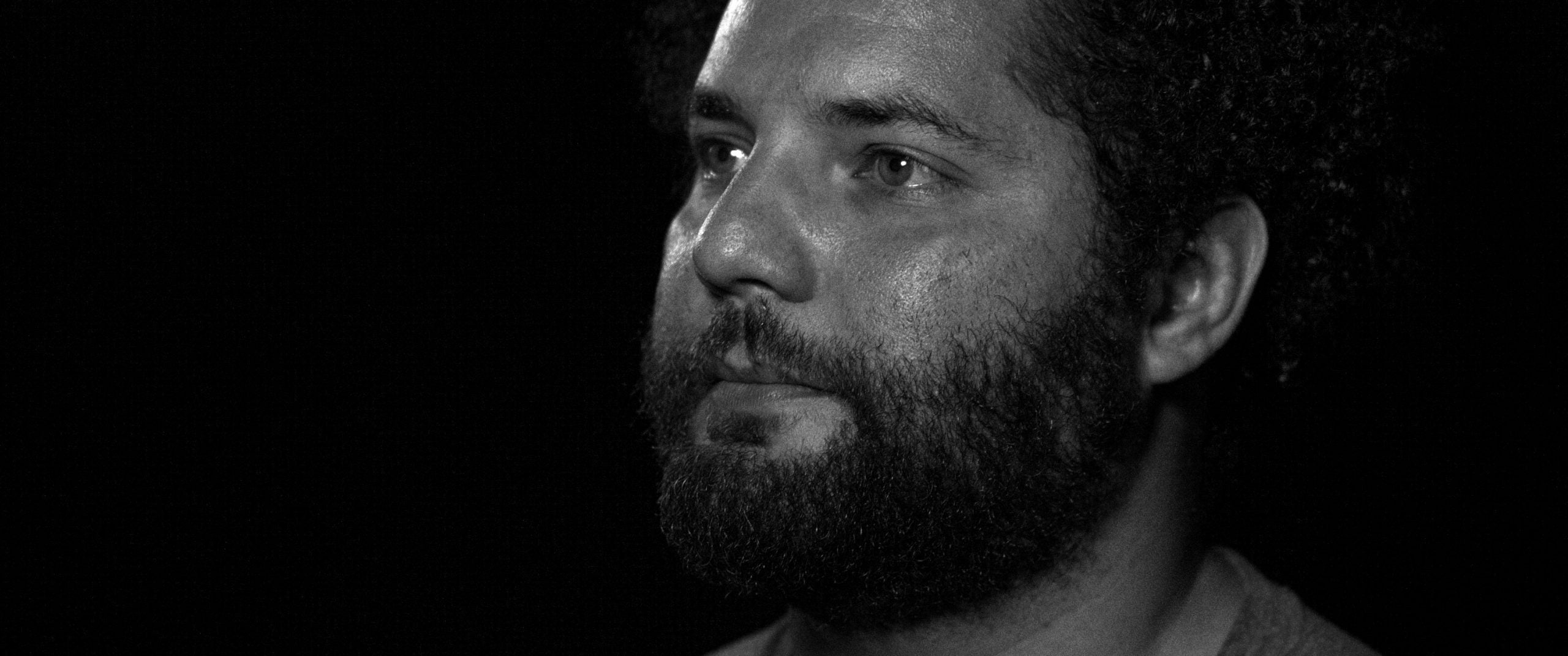
Mark’s lessons pair scholarly journal articles with poetry, YouTube videos, and podcasts. He employs different teaching strategies: lectures, simulations, and games. He invites students to imagine what it would be like to be a leader, a legislator, or a rebel in a time of upheaval. Suddenly, theory and practice become meaningful exercises, and lessons carry weight.
“I want students to have modesty about what they know and not blindly accept information. We see in history that most of the time we can all reach some sort of agreement that doesn’t involve violence or discrimination,” Mark says. “I tell students, be willing to recognize you could be wrong about a lot of things you believe.
“It’s OK to be wrong.”
“The Founding Fathers themselves disagreed on what the Constitution meant.”
Christopher Parker
Christopher Parker, assistant professor and pre-law advisor in the Department of Political Science, teaches courses on Constitutional law and civil liberties. Through the study of case law, Parker seeks to illustrate to students the difference between ethics and the law, encouraging students to express their opinions and to recognize the consequences of trying to restrict speech they don’t like. “The antidote to bad speech is more speech,” Parker says, paraphrasing Supreme Court Justice Louis Brandeis.
What’s problematic is that censorship curtails everyone’s rights in restricting the speech of a few or many, Parker says. “I want students to recognize that the Founding Fathers themselves disagreed on what the Constitution meant; flawed people created this document out of compromise.
“And that compromise led to a lot of vague language that creates a large number of the debates we have now.”
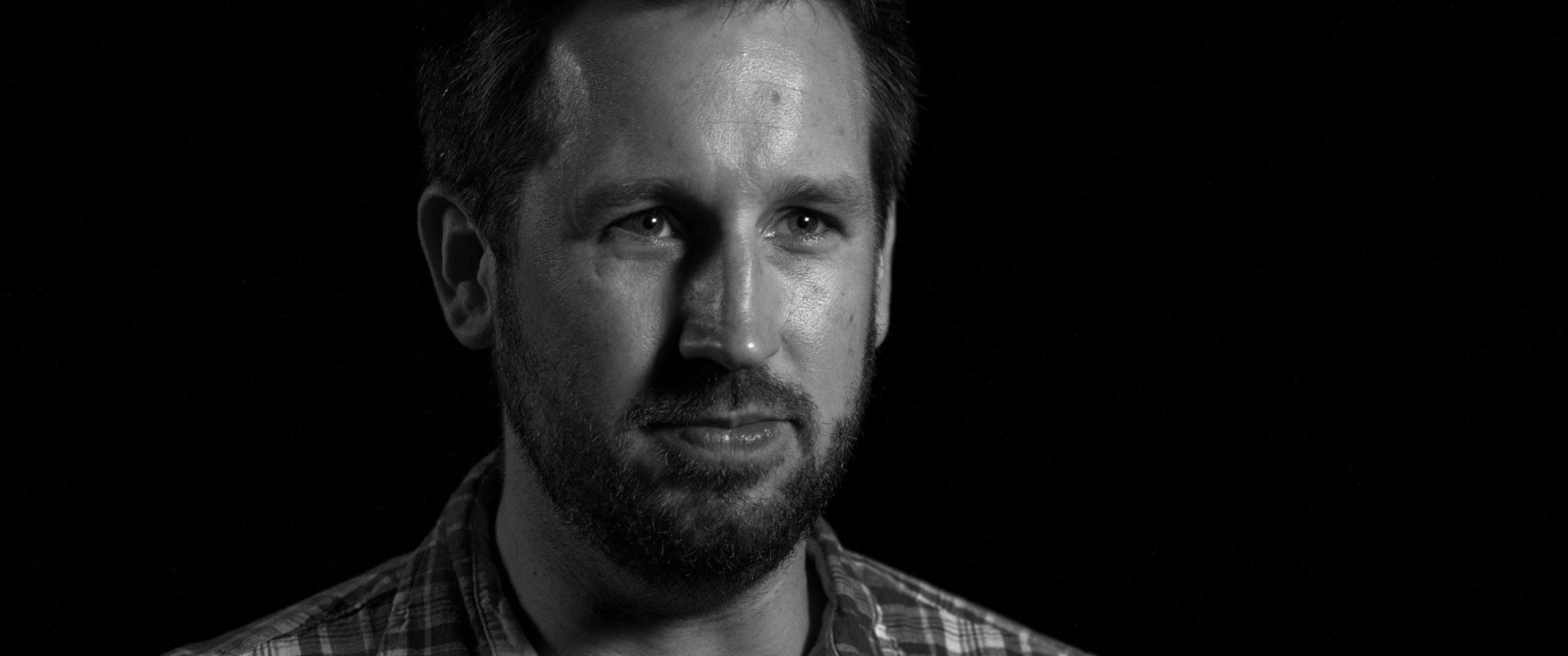
History free of romanticism allows a student to approach the Constitution with a critical eye, Parker says. He invokes James Madison: ‘If men were angels, no government would be necessary.’ And certainly, if we didn’t have the protections provided by the First Amendment, we’d have to be extremely trusting of the government.”
Any argument, any stance a student wishes to take is welcome in Parker’s classes. “I play devil’s advocate and make whatever argument the class is moving against,” Parker adds. “I hope my classes change students’ perspectives and get them thinking of new ways to approach problems.”
“Poems, songs, plays, and fiction have a long, proud history of speaking truth to power.”
Carolyn Betensky
Hope holds across disciplines. English professor Carolyn Betensky teaches “OUTRAGE! Literature of Protest and Dissent,” a course featuring such texts as Margaret Atwood’s The Handmaid’s Tale, Larry Kramer’s The Normal Heart, and Angie Thomas’ The Hate U Give. Betensky’s course examines literature that engages oppression and, through the texts, Betensky introduces students to civic engagement in its various forms. “Poems, songs, plays, and fiction have a long, proud history of speaking truth to power,” she says. “My job is to get students to look at texts, to look at facts, and to evaluate them — maybe even to argue against them if they like.
“Preparing graduates for their public lives as citizens, as members of communities, and as professionals is a responsibility of institutions of higher education.”
“Without the First Amendment, there would be no democracy.”
John Pantalone
Arguably, there is not enough education happening around the First Amendment these days. A 2017 survey conducted by the Annenberg Public Policy Center of the University of Pennsylvania highlights the need for a nationwide civics lesson:
- 37% of American adults surveyed could not name one right guaranteed to them under the First Amendment.
- 53% surveyed thought immigrants here illegally have no rights under the U.S. Constitution.
- Only about 25% could name all three branches of government.
John Pantalone, associate professor and chair of the Department of Journalism, is not surprised by these statistics. Whole classes in the journalism department are built around the First Amendment, he says. “When students finish the program, they have a very healthy understanding of the rights it protects.”
And if this knowledge of the First Amendment is applied in pursuit of a career in journalism or more serves to inform students’ civic lives, it is an essential education, Pantalone says.
“Part of the goal for any student in our department is that they understand what it is to be a good citizen in a democracy. And without First Amendment rights, there would be no democracy,” says Pantalone. “People should use their First Amendment rights responsibly out of an obligation to contribute to civil conversation.”
We are being tested as a country, Nasser Zawia says. Faculty should engage their students, openly discuss with them what’s going on. “We’re being tested about our tolerance, our diversity, our core values,” he adds. “Even about scientific beliefs.”
The university community, Zawia says, should be able to converse, debate, and learn from one another. “It’s a unique opportunity for students to come to a university and interact with so many different and diverse people,” Zawia continues. “This is the time for them to learn how to work with the world. Our role as teachers is to steer this ship and make sure everybody gets a chance to speak their mind.
“Everybody deserves a chance.”
Stories of the First Amendment in Action Part 5
Challenging Convention
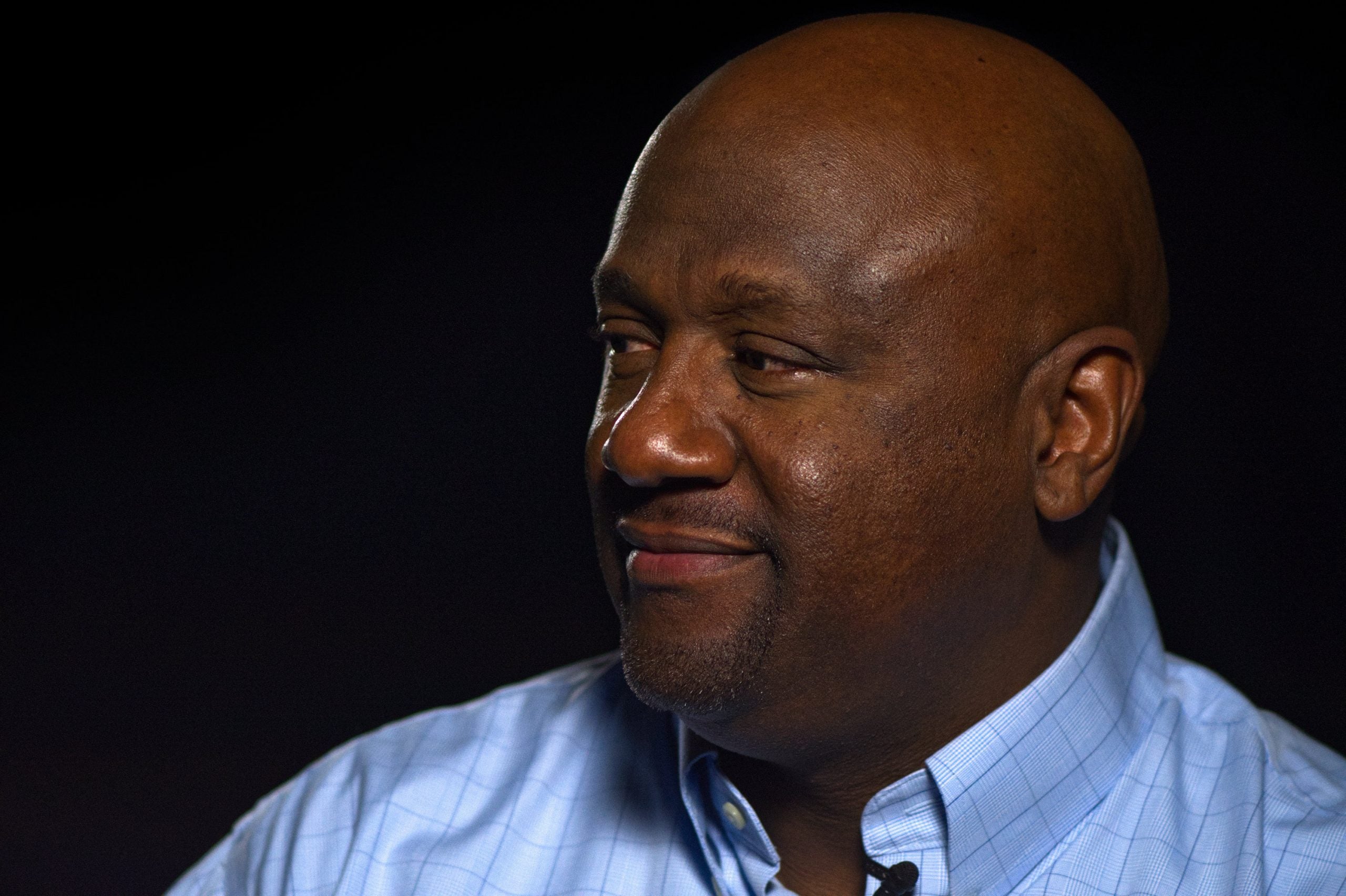
— Carnell Jones, Jr.
History teaches us that speaking truth to power or participating in the marketplace of ideas carries real risk: the loss of a job, assault, arrest, incarceration, even death. Very recent history, though, tells us that this generation of students is all-in and head-on when it comes to exercising First Amendment rights.
In April of 2019, The Washington Post declared, “Young people actually rocked the vote in 2018.” According to The Post, the U.S. Census Bureau claimed that 36 percent of citizens ages 18 to 29 reported voting in midterm elections, up 16 percentage points from 2014. And in June, media outlets Forbes and The New York Times noted that students, many still in their teens, had made significant contributions to the Black Lives Matter movement, organizing protests, raising awareness on social media, and donating money to activist organizations.
Today’s youth is informed, engaged, and ready to act, says Carnell Jones, Jr., URI director of enrollment services and creator of the course Black Lives Matter. And certainly, URI students Theresa Brown ’21, Sam Foer ’20, and Ian Weiner ’20 are proof of Jones’ assertion.
“This generation questions everything.”
Carnell Jones, Jr.
URI director of enrollment services Carnell Jones, Jr. has taught his Black Lives Matter course since 2015. If you’re thinking right now that you’d like to take it, plan for the spring of 2021 — at the earliest. The fall class is already full. “People are always trying to get in,” Jones says with a grin. “My classes are always full.”
The readings change each semester to address current events and include other groups’ trials in the battle for civil rights. The fall, for instance, will now include readings and discussion about the Supreme Court’s recent ruling that the 1964 Civil Rights Act protects LGBTQ employees from discrimination based on sex as well as the court’s decision to block the revocation of the Deferred Action for Childhood Arrivals program, popularly known as DACA, which has protected from deportation some 700,000 individuals brought to this country as children.
Another teaching tool: Carnell Jones, Jr.’s own painful personal history with racism and violence.
In 1986, a then-14-year-old Jones attended the funeral of his 18-year-old uncle, Kelvin Thompson, murdered by two white men, who shot him while he was riding a bicycle. “To go to that funeral, to see my uncle in a casket, was life-changing for me because that was the first time I saw real pain,” Jones recalls. “I had never seen my grandmother cry. I’d never seen my 17 uncles and aunts cry. I’m talking about wailing crying.
“My mother was traumatized. She felt she had to do everything in her power to protect her three sons,” Jones says. “Everything” meant home confinement for Jones and his brothers when they weren’t at school or engaged in sports. “My mom would tell me that when interacting with the police or just folks outside of my comfort zone, to just swallow my pride.”
“‘I just want you to come back home,’ she would say.”
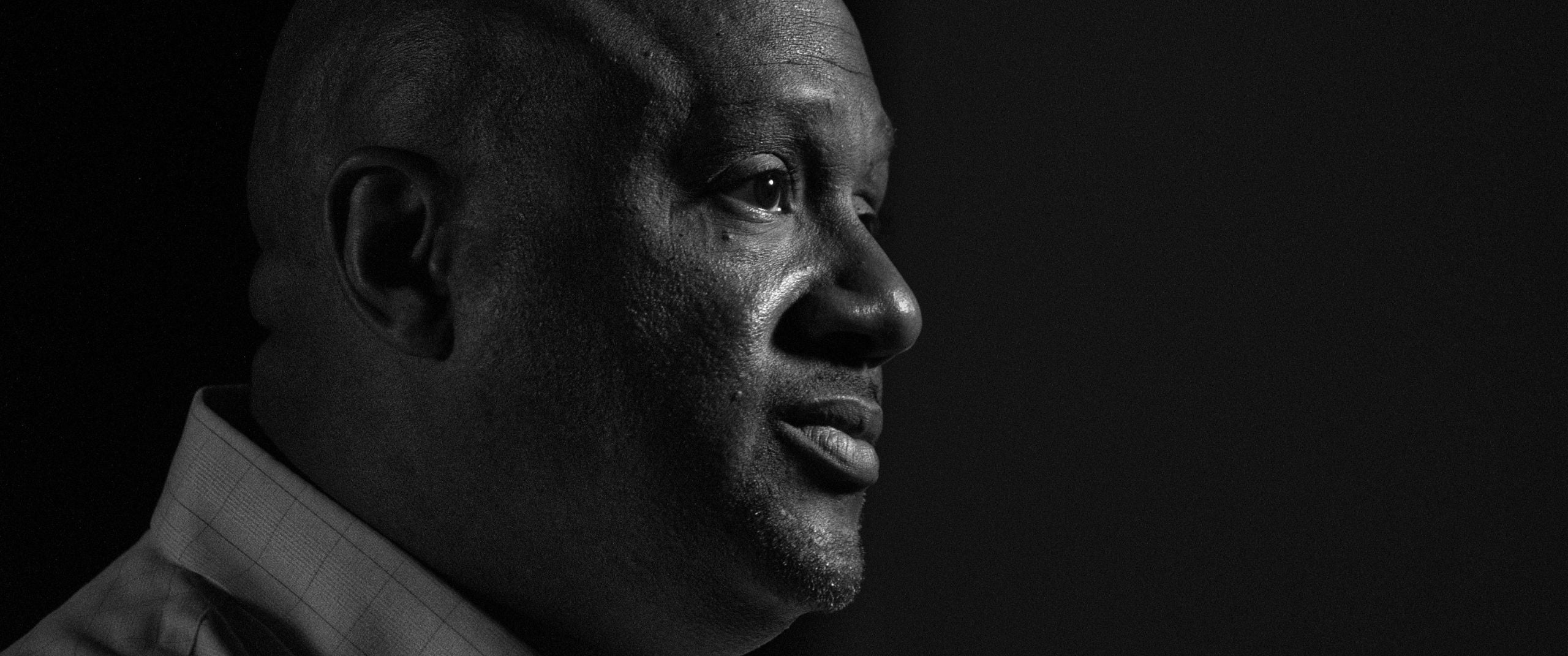
A generation later, Jones sees the intersection of two historic events, the Black Lives Matter movement and COVID-19, spurring society to rail against racial injustice in numbers not seen since the civil rights movement. “The pandemic has forced the world to be on pause, and people are seeing events happening, and saying, ‘This is wrong,'” Jones says. “This is why you see people flooding the streets.”
And some faces are familiar.
“I’m seeing my students out there exercising their First Amendment rights, actively protesting, passionately speaking, taking up the movement, and carrying it forward,” Jones says. “They feel knowledgeable and informed enough to take a leadership role on a societal issue.”
It’s confirmation that what he’s teaching is resonating, Jones says.
“During the civil rights movement, if you were to participate, you would sacrifice something. You could lose a job, a scholarship. You pretty much had to participate in silence,” Jones says. “This generation questions everything. They push back. They’re not concerned about sacrifice.
“They’ll take the risk.”
“You’re there to tell people the truth, to be a monitor of power, a voice for the voiceless.”
Theresa Brown ’21
Journalism major Theresa Brown wrote four-to-five stories a week as a reporter for The Good Five Cent Cigar and a member of the paper’s investigative arm: The Cigarlight Team, a name coined from The Boston Globe’s Pulitzer Prize-winning Spotlight Team. Brown savored the chance to investigate stories and usher them into print. She also learned some valuable truths: “You’re not there to make people happy,” she says. “Being part of an investigative team opens your eyes to the fact that not everything is sunshine and rainbows.”
People would refuse to talk to the student journalists, Brown says. It was disconcerting. At first. With time, Brown, now editor-in-cheif of the Cigar, came to understand that as a journalist and citizen, she had the right to ask questions other students and administrators didn’t necessarily want to answer.

“I take journalistic integrity seriously,” Brown says. “I am balanced and fair and I’m going to get all sides of the story. And I recognize that when you’re reporting on a university you are a part of, there is a huge conflict of interest.”
Familiarity with the First Amendment is a must if students want to get into this type of work on campus or as a career choice, Brown says. “For me, freedom of speech is the freedom to write about and report on information that people have the right to know.
“As a journalist, you’re there to tell people the truth, to be a monitor of power and a voice for the voiceless.”
“We leave ourselves uneducable if we dismiss people based on viewpoint.”
Sam Foer ’20
Sam Foer is looking to mix it up. With faculty, administration, students. You. “Good-faith constructive discourse and thoughtful argument are where you see the First Amendment in action,” Foer says. “Lively discussion concerning controversial topics is absolutely imperative for a functioning democratic society. We students should feel immense pressure from our professors to challenge each others’ viewpoints, without being pressured to give them up or change them.
“In a university setting, students should feel an obligation to improve their intellectual faculties, and this means having professors who make us feel somewhat uncomfortable with what we think without making us feel bad about thinking it.”
Foer, a philosophy major and a founder and former president of the URI branch of the American Civil Liberties Union, argues that it is a student’s responsibility to know their First Amendment rights and to exercise them — and to defend the First Amendment rights of people whose views they abhor.
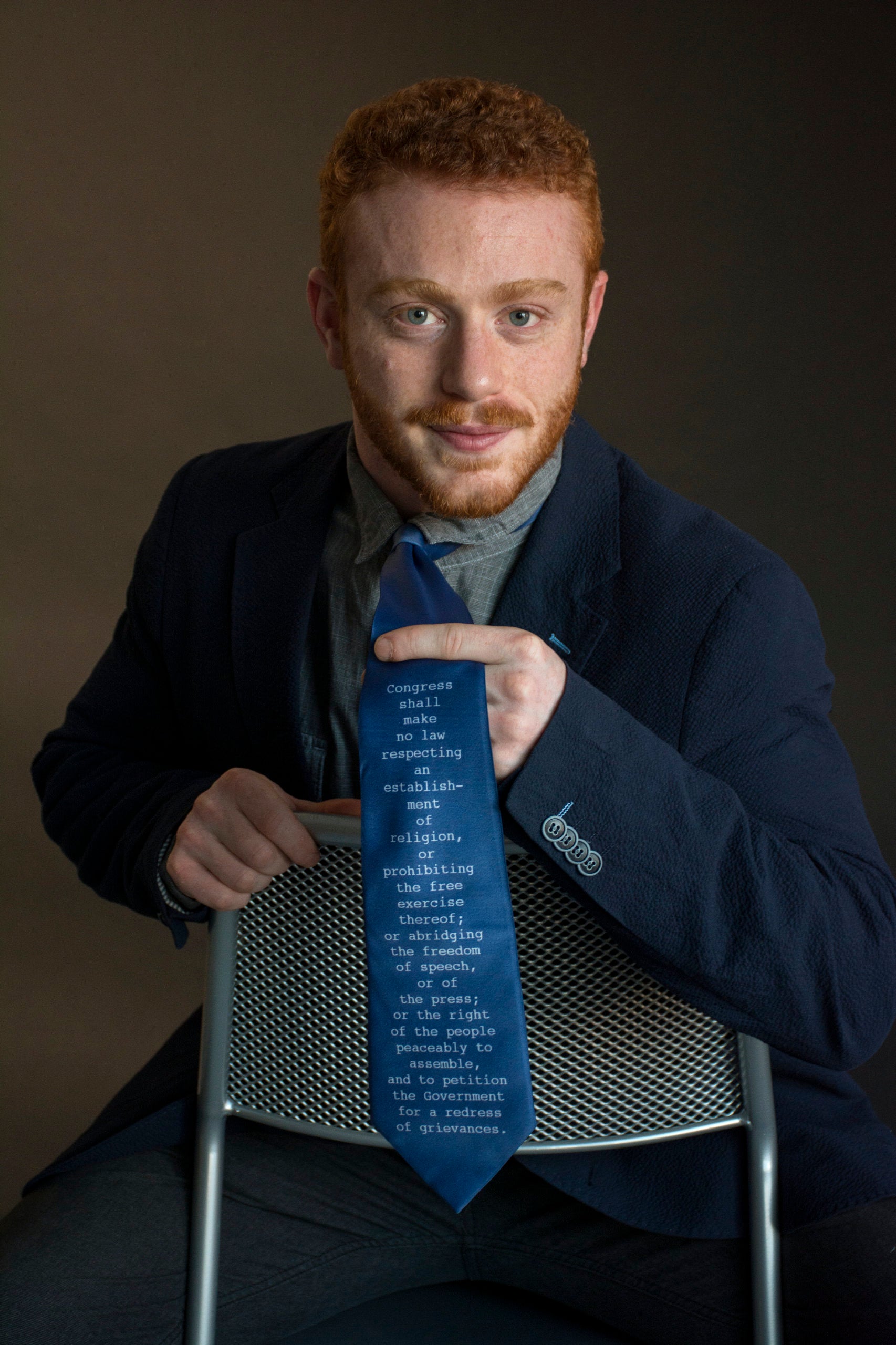
“Yes, the First Amendment guarantees the rights of people to say nasty things, as it is necessary for speech that is predicated on opinion to be protected; otherwise, we can censor anyone whose opinion we dislike,” Foer says. “But if we can keep dialogue civil, even when someone is saying nasty or disagreeable things, perhaps we can open them up to changing their minds.
“We need to find problems with what the person is speaking and press them on those problems,” he adds. “We leave ourselves uneducable if we dismiss people based on viewpoint; we leave the world uneducable if we strip someone of the right to speak on that basis,” Foer says. “We can’t have freedom from speech. If we don’t protect everyone’s right to speak their mind, the First Amendment is null and void.”
“It’s the journalist’s job to interpret the First Amendment in a responsible way.”
Ian Weiner ’20
One of Ian Weiner’s proudest moments as a student journalist was the day a reporter from Rhode Island’s daily newspaper, The Providence Journal, called him because she’d seen a story he’d written and published in The Good Five Cent Cigar. She wanted to use it as the basis for a story of her own. This was more than an ego-stroking moment, Weiner says, it was evidence that The Good Five Cent Cigar was doing important work.
“We were struggling in the fall of 2018,” says Weiner, journalism and communication studies major and past editor of the Cigar. Staff numbers had declined and morale was low. Weiner started reading up on the First Amendment. “I wanted to know how far I could push my staff,” he says. “The First Amendment taught me about responsibility. My whole thing was to get student reporters through the door and have them working, teaching them things like long-form journalism.”
And teaching them what it meant to be a responsible journalist.
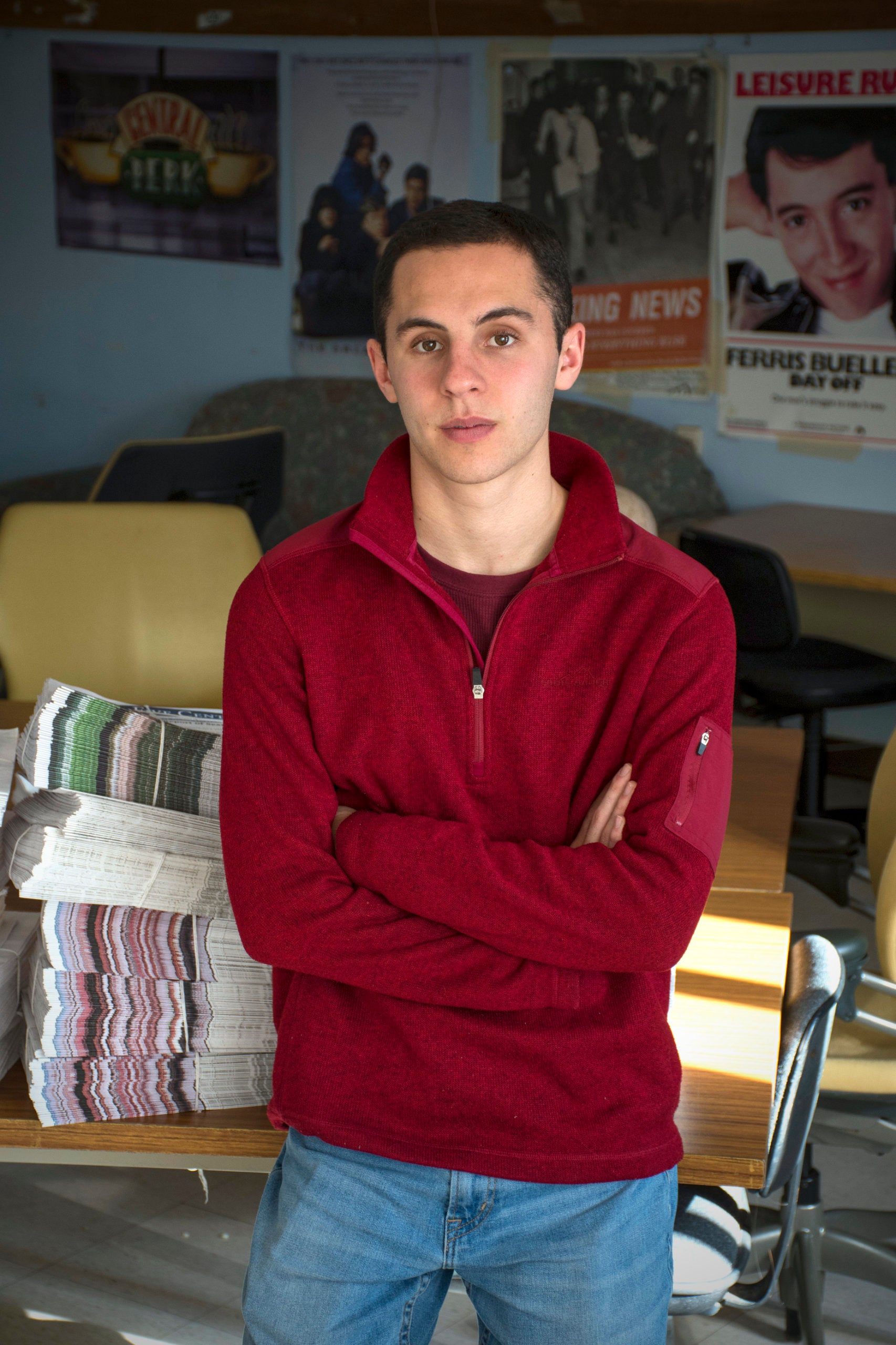
“Anybody can put something online. Spotting fake news is really hard. And you are in the public eye,” Weiner says. “What you do matters.
“One thing about the First Amendment as the baseline for journalistic freedom is that it can be interpreted in many ways, but it’s the journalist’s job to interpret it in a responsible way.”
Journalist Christiane Amanpour, ’83, Hon. ’95, CNN chief international anchor and host of PBS’s Amanpour & Company, poses this challenge to students: Speak. Argue. Battlefront or classroom: Each offers the opportunity to take a stand.
“The idea that you have to be safe from ideas that conflict with yours is wildly wrong. If not at university, where are you going to have the freedom to explore ideas that you don’t like, even people that you might not naturally gravitate toward?” Amanpour says.
“It’s here in this safe space that you can actually operate in areas that you are in conflict with or don’t understand or that you think are offensive — that’s how you grow, and that’s how you grow resilience,” Amanpour says.
“And that’s how you grow intellectually and find your way in the world.”
